War Letters: Rochester Writes Home is a local WXXI-TV production featuring correspondence to and from Rochester area soldiers who served in every conflict America has entered. War Letters: Rochester Writes Home honors local veterans and active military who have dedicated themselves to the defense of our country. The letters are drawn from over one thousand letters sent in by Rochester area residents and those available from the Rochester Public Library, the Rochester Historical Society, the Rochester City Historian, and the Rare Books collection at the University of Rochester.
About
It was a crisp October day. War had come to upstate New York.
We soon discovered the fleet sailing toward us, from the direction of Braddock’s Bay but not anticipating any danger, we remained on the spot until it approached quite near us. We were shortly saluted with a 24 pounder, which whistled through the bushes near where we stood and entered the bank of the lake in our rear. This shot was in rather too close proximity to us to be agreeable.
On another October day 132 years later, another Rochesterian is face to face with war, this time on a muddy field in France.
We have been shot at with a wide variety of items (too wide a variety) but I think the worst part of war is the dreary separation from loved ones, complete lack of creature comforts, fatigue, wet, cold and dirt! Pick out the dirtiest job you know and do it for a month without bathing, going two and three days at a time without washing even your face and hands and you have a good idea of how war feels.
Rochesterians have witnessed war from 1812 to Desert Storm. From military life to the hopes and fears of those left back at home, Rochesterians have chronicled their times in letters. At times touching, tragic, filled with horror, even humorous, those letters are an important legacy that until recently has been all but ignored.
War Letters: Rochester Writes Home is an local documentary that builds on the work begun by The Legacy Project, “a national, non profit initiative that works to honor and remember those who have served this nation in wartime by seeking out and preserving their letters.” It is also a companion to the American Experience program, War Letters: Extraordinary Correspondence from American Wars.
War Letters: Rochester Writes Home is a story without a narrator, told entirely through the letters of those who went to war and those who waited, sometimes in vain, for their return. Using archival photographs and film, War Letters gives full meaning to life in a foxhole, to the realities of rationing, to the loss of good friends, and to the joy in greeting a new day. War Letters has the voices of Rochester’s heroes from Patrick O’Rorke, who died helping to save the Union’s left flank at Gettysburg, to General Elwell Otis in the Spanish American War. It also has the voices of the many unknown soldiers and sailors, their wives, parents, friends and relatives. The stories are drawn from over one thousand letters sent in by Rochester area residents and available from the Rochester Public Library, the Rochester Historical Society, the Rochester City Historian, the Rare Books collection at the University of Rochester.
War Letters: Rochester Writes Home made its local premiere December 7, 2001, the 60th anniversary of the attack on Pearl Harbor. The letters are read by an eclectic group of area on-air personalities and civic leaders as well as relatives of the letter writers and the authors themselves. The program was inspired by the American Experience: War Letters cataloguing letters at the national level and the Legacy Project, a project to promote preservation. The local documentary stems from the Sunday, November 11, 2001, airing of PBS’ national broadcast of War Letters, a collection of newly discovered personal correspondence that brings to life the deepest, most human side of war, from the American Revolution to the Gulf War. Based on Andrew Carroll’s recent New York Times bestseller, War Letters: Extraordinary Correspondence from American Wars, the film transcends the subject of war by exploring the love, passion, pain, horror and hope of the men and women who fought and those who waited at home.
Civil War Letters
Elmira Barracks No. 3 May 10, 1861
They gave us bad hash the other night, it tasted just like kerosene oil and smelt oily. They fed 1025 of us at one meal in one room—an unfinished machine shop…that night when I called the roll…a succession of sleepy cries of “speech from the orderly” arose, whereupon I began to hold forth in the dark on the slavery question and had gone on flowingly for some time when feeling rather bubbly, I exclaimed, “What killed the republics of Greece and Rome, and what is sapping and undermining the foundation of our glorious Union?” “Bad hash! Bad hash!” was answered by every one of the 80 men in the barracks. The cry was taken up by the whole of the regiment. Bad hash! Bad hash! Until Charles Edward Mac Canty, our drummer, sat up in his bunk and roared out in stentorian tones “Shut up you damn fools. You’ll get enough of it for breakfast.”
The next day at dinner the beef stunk a little. The window into the cook room was open and the chief cook was standing there in all his glory. One of my men grabbed up a plate and threw it beef, plate and all at his portly person exclaiming “You God damned black hearted white livered son of a bitch, don’t you ever set such stuff as that before me again.”
The same day the Utica company threw their pails of soup on the table, in short we had all we could do to prevent a mutiny.
— Samuel Selden Partridge, 13th NY Regt.
June 14, 1861
I think we do have fine times. Not fine times when compared with the pleasant hours spent at home with our loved ones but fine times when compared with what might be. Life is just as we make it. We can be happy almost anywhere if we only think how much worse off we might be. This is the true secret of happiness.
(when challenged by another writer to explain how he could have “the conscience to say that we are having fine times)
May 29, 1861
As I sit here, while twilight is stealing in upon me, I can but think of home, and of all the dear friends left behind. The happy hours of the past are lived over again. Again I see the kind faces, again I hear the tones that are so sweet to me. As I sit here alone thus musing the strains of “Annie Laurie” steal in upon my ear. The men, too, are thinking of absent and loved ones. The roughest soldier among us has a quiet corner of his heart that he keeps hidden from his comrades’ eyes. There he keeps green the memory of those who are all and all to him. Occasionally a tear starts into his eye but is hastily wiped away. Were it not for this feeling in the heart the men would be a great deal worse than they are.
— Edwin Gilbert 13th NY (as his regiment leaves Elmira recruit depot, on the feelings of men going off to war for the first time)
Diary from October 24, 1863
If only the folks at home could see how a soldier makes himself comfortable. I myself went a mile to obtain a fence rail for a bed. Two of these are laid so that the sharp edge is inside. The thick part is outside so that kind of a tray or trough is formed. This is the bed; then my tent is stretched over it; that is the house. Others just lie down on the wet ground.
I myself am frying a little piece of meat held on a pointed stick over the fire. It is half burned and half raw but that does not matter; a cup of strong coffee causes it to slide down. Then I lay myself down on the fence rail bed where I look at the starry sky and fall asleep.
— August Seiser, 140th NY
General McClellan’s Head Quarters, Friday October 3, 1862
Cousin Augusta
You ask me if I will not be glad when the last battle is fought. So far as my country is concerned I, of course, must wish for peace and will be glad when the war is ended but if I answer for myself alone, I must say that I shall regret to see the war end. I would be willing, yes glad, to see a battle every day during my life. Now do not misunderstand me. I speak only of my own interests and desires perfectly regardless of the world besides but as I said before, when I think of the pain and misery produced to individuals as well as the miserable sorrow caused throughout the land I cannot but earnestly hope for peace, and at an early date.
— George Armstrong Custer, writing to his cousin Augusta Frary of Geneseo
3rd New York Artillery
Tuesday August 25th, 1863
Newburn, North Carolina
Dear Brother Isaac,
As I have long been thinking of writing you a letter I thought I would occupy a few moments this afternoon as it is a rainy day and I have nothing else to do. There is no special news of importance at present, all is quiet here, the weather has been very warm here for about six weeks and it is yet. It is very unhealthy here at present, about one third of our company is on the sick list. Our camp is on a little knoll, completely surrounded with a swamp which makes it very sickly, mostly fevers and chill. As for myself, I am feeling quite well at present but rather weak. I have been sharing my part with the rest in fevers and chills but the worst of my sickness was the Asiatic cholera. I was not expected to live hardly from one hour to another by the doc and others who saw me. My limbs were cold, my pulse had stopped and they said I was black as a boot but I did not realize my danger and I was taken on the first day of July. I went to the hospital and staid (sic) until the 14th. When I returned to my quarters I cannot begin to describe to you my suffering until the disease was checked but the good Lord lay beneath me his almighty arm and raised me to my usual strength again. I saw three die while I was at the hospital, died with fevers. It was a solemn sight.
Isaac, what do you think of the present prospect of the war closing within six months longer? I think the prospects are favorable. I think that most of the fighting is done unless there should be foreign intervention but I have no fears of that.
Wednesday August 26th
All is quiet here this morning. We had a very fine rain last night and cooled the air off finely. I am feeling first rate this morning. Hope you are all feeling the same. The report has just come into camp that Charleston is taken by our forces and that the stars and stripes are now waving over the city but how true the report is I cannot say. Hope its true. It begins to seem as though the war is about in its last stages. It seems to be generally thought that the war cannot last but a little longer and for my part I don’t care how quick it is closed off for I feel in a hurry to get out of this awful unhealthy climate and I am getting very anxious to see my family and friends once more. I think if it is in my happy lot to see old York State again, I shall comfort myself to stay there. Isaac, I for sure you have got your mind made up to settle in old Cayuga if the war is settled satisfactory, haven’t you? I think you could not do better. Cayuga is one of the most healthy and fertile counties in the state. I know you would like it. Please think of it and when you write, tell me what you think about matters and things in general. How is your crops this year? Good, I hope. What are Christopher’s folks doing this summer? How does Abram and Minerva get along? Oh how I should like to come to old Hoosick and make you all I visit and if I live to get out of the army I think I shall come. If nothing happens.
August 28th
Yesterday it was so cold we had to set up our stoves and build a fire to keep comfortable. Today is plenty warm without a fire but very little clothing so you see the weather is very changeable.
Thursday August 29th
A very rainy day. We’re all cooped up in our tents making ourselves as comfortable as we can. I wonder what you are doing today, spredding around I presume as usual. It is just one year ago today since I enlisted. How many have been slain during the year and I am still spared and hope it will be my happy lot to return home once more safe and sound. But time only can tell what is in the future.
August 30th
All is quiet here but we heard heavy cannonading all night. Thought it was in the direction of Wilmington. I received a letter last night from my family. All were in usual health. It was good news to me. William Gidney’s and ??? health were all better than they have been. Hope we may all live to meet again on Earth once more but if not it is my prayer that we may all meet in heaven and part no more. Give my love to all inquiring friends and accept the same. Write soon as you get this direct. Accept these lines from your true and affectionate brother Jack Coo(?)
— from letter donated by Bruce Hall, 8517 rt. 90 King Ferry NY
After Bull Run
The bullets whistled around like hail and it is to me a perfect wonder that I did not get shot…to my astonishment, I was never cooler in my life nor felt less fear.
July 29, 1861
Our little regiment acted like old soldiers and acquitted themselves far beyond any expectation.
But it was a military blunder as I ever heard of. A boy would have or ought to have known better.
The mere loss of men is nothing compared to the demoralization caused by the retreat. O that retreat! I’ll never forget that night. It was worse than the battle. I cannot give you a picture of the scenes on that road, men overcome and lying down on the roadside, caring neither for death or liberty, wagons overturned, and the ever pressing throng of horsemen, footmen, baggage wagons, and ambulances. And weary mile after mile was passed till morning came.
I hope that whatever experience I may have as a soldier I will not have any more such as that night.
(Charles Curtis Brown rises to Lt. Col. Of 22nd NY Cavalry, was sent out to keep watch on army’s flank at battle of Wilderness, unit was stampeded by rebel artillery. Brown described the chaos when men and horses tried to scramble back through swamps)
May 7, 1864
Some horses went down completely and others tumbled over them. Every moment I expected to be engulfed in the mud, horses and humanity. I would tumble over some, others over me. All this time the shells were bursting over us adding horror to the affair.
October 15, 1864
I never enter battle without thinking too much of you and Katie. Too much for it distracts my thoughts from the work before me. It was not so before we were married, for though you were in my mind a good share of the time, still I did not feel as though you would be the chief sufferer by my death. Now I think all the time. Poor Sallie my darling wife, what will she do if I am killed, and it almost makes me shrink from incurring the danger. A loving husband must be a hero indeed who makes a good soldier.
— Charles Curtis Brown between serving with the 13th NY and the 22nd Cav., Brown married, later had a daughter, Katie. He wrote to his wife on how that had changed his outlook as a soldier, 1861-65, originals at U of R
September 21, 1862
…the horrors of the battlefield. On my way from Greencastle to Williamsport, I passed over the field where they fought the day before. There were men with one leg, one arm, bodies without heads or with only part of a head. I saw one man who was hit with a piece of shell with the back part of his head cut entirely off, he was still alive. At one of the hospitals, I saw a stack of arms and legs 4 feet high.
December 1862, Frederick City
We have been doing picket duty for the past 2 weeks. The first time I went on my post the rebels were on the other side of the river and one of them threw down his arms and I did mine and we mounted our horses and each rode to the middle of the river and there we had a little chat and finally I treated him with some coffee for a plug of tobacco and we parted. He was a young man about my age belonging to the 3rd Virginia Cavalry. I have met and talked with them two or three times since. There has been a great battle here and the rebels were too many for us. They killed a great many of our men.
Catlett’s Station June 15, 1863
When the rebbs charged on us, one of them came up to Sergeant Borows and said “surrender you yanky son of a bitch” and another shot his horse from under him. Then Borows shot him and brought him to the ground and a spring brought him by his side where he bead his brains out with the but of his pistol. One of Major Pope’s orderlies was attacked by 3. The first he shot dead, the second he thrust through with his saber. The third shot him through the head and his battles were ore.
(July 6, 1863 good long letter after Gettysburg, was wounded)
August 18, 1863
You don’t know what real fun is till you get in a fight where the waseps (bullets) whiz, w-h-I-z—and the bomb shells go boo—woo—oo—oo bang w-h-I-z all around your head like rain and drop like corn among the chickens and you call feel the wind in your face as they pass. Then you can see the fun. I used to be a little skittish when I commenced but I have got over that now. All I think about now when I get in a fight is where is the nearest rebb and the next thing you hear from me is the crack of my gun and perhaps a yell if I can see any effect from the shot.
— Daniel Pulis 8th NY Cavalry
July 24, 1861 (following 1st Battle of Bull Run/Manassas)
When a bullet goes into a man’s head it makes a crash among the bones that can be heard distinctly for some feet. It is horrible to be cautioning a man beside you to sight well before he fires and while he is following your advice to have a bullet pass clear through his head—and a torrent of blood from his mouth gush all over your face. I cant relate all of this kind that I went through—it sickens me.
July 20, 1863 (describing the scene on July 6th as he walked along Cemetery Hill in Gettysburg. He was stunned by the devastation and walked among a multitude of wounded Confederates)
One poor fellow was in a delirium and crying for his mother. Another was begging for mercy and deliverance from on high. And again there was a wounded sergeant who did not seem to mind his wounds, but was laughing and talking with our own soldiers.
However bad the rebel cause may be and however just the war is as waged against it, the soldiers engaged in it have won the respect and admiration of their adversaries, the Federal troops, for their undaunted bravery and fortitude. They are not a whit inferior in valor and soldier-like qualities to our own troops. Both sides are equally matched in that respect.
— Samuel Selden Partridge
Grape, cannister, shells and minnies were poured into us from the front and from the right shells were thrown into us, raking us and exploding in our ranks fearfully. We had 3 board fences to go over and through and no cover. How any man went up and back again alive is more than I can imagine.
Without straightening up I just raised my head a little to find a good place to get over and through when a ball took me in the top of the cap clear back and scratched my head down the back side passing through my cap again near the bottom of the back of it. It tumbled me of course but in about 3 minutes I was up again.
— Edward Pierce 108th NY December, 1862 (describing charging the stone wall at Marye’s Heights at Fredericksburg)
The earth is shaking. The sun looks bloody red: it is terribly, horribly beautiful; all kinds of bullets rain in every direction.
We lie like pigs in dirt, the whole night in a heavy rain, getting such sleep as we can.
Here it is again: throwing up trenches under a hail of shells from the rebels. Here and there one falls down, axe or spade in hand, hit by a bullet: yet that is nothing new.
How is it possible to endure such strain and how long will it still last in this way?
— August Seiser 140th NY Diary from May 8-15, 1864
Camp, 11th US Infantry
City Point, Va.
March 11, 1865
My dear Cousin Hannah,
I believe I owe you a letter, having received one from you the day after writing me one which you will have received ere this.
The weather here still continues very changeable and I may say without exaggeration that it rains four days out of seven. The roads are in an awful state, rendering them more like creeks of liquid mud than paths.
I do not think of anything to interest you unless it is an execution of a deserter that we attended yesterday:
— The battalion formed yesterday morning at 10 a.m. proceeded about two miles through the mud and ruin to the appointed place, where the execution take place. Here we of the troops composing “Patrick’s Provost Guard” formed three sides of a large square, at the other side which was the grave near to the gallows where we hang spies. We (?) opened ranks and the front rank faced about; then the provosts enter at the right of the line and proceed between the ranks to the other end. First came the Band of the “Coll’s Zouves” playing a funeral dirge, then the Provost Marshall, next a squad of men with arms (raised?), followed by the coffin borne by four men, then came the prisoner attended by a chaplain and followed by a guard of men with fixed bayonets. After passing through the ranks and arriving at the grave, the coffin was placed at the edge and the prisoner was placed at the edge of the coffin, the firing party forming 12 paces from him. The Provost Marshal then steps to the front and reads the sentence convicting Private William Remson alias George Colger Co. B 8th Delaware Volunteers of Desertion and sentencing him to be shot to death by musketry at 12 p.m. the 10th day of March, 1865. The prisoner then addressed the troops giving us a brief account of his military career but as the square was pretty large I did not catch all his words—all I understood was that he entered the service as a Lieutenant in a New York Battery. Twelve oclock (sic) having arrived the firing party came to attention. The command of “Fire” was given, he did not flinch an inch, fell over into his coffin and died like a man. The band then took position in the center of the square playing (??) as troops moved by the flank past the —–and body of the —–and then home to their quarters. Such is a military execution, imposing to a stranger but to a soldier who is accustomed to death in all shapes, rather a bore, especially when he is dragged through the mud and rain for two miles to witness it and I am sorry to say I heard men yesterday cursing the poor fellow for being shot and taking them out in the rain. Well to be sure it was no enviable job to polish one’s shoes and get the mud off your clothes for evening parade.
While on furlough I had some photographs taken. When I receive them I will send you one and you can tear that one I sent from Alexandria up. It is such a mean one that I am sorry I ever sent it to you.
Give my love to Uncle, Aunt and Cousins,
Believe me
Your affect. Cousin
— George Merryweather, 1st Sgt Co. E 1st Batt., 11th US Infantry
Camp of the U.S. May 20, 1864
Dear father and mother
Today I sit to write you a few lines hoping they may find you well. I will give you a description of where we are and how we are situated. We are on the Appomatox. This is a small river running into the James above City Point. This is the left of our line. It runs from here to the James. We have throwed (sic) up a line of brush work the whole length. We expect they will try to drive us out of here—there is heavy firing on our right. It commenced this morning at daybreak. We are where we have got to fight pretty near all the time. We have been here two weeks and fought six days and fought four days and nights without ceasing. The boys from Newberuine (sic) have been very lucky–so far, not one of them hurt. It is not likely that the captain will ever be with us again. He will be a cripple for life.
The boys are well. I am well. I send you a piece of wire that I took off the telegraph that runs from Richmond to Petersburg. Tell mom that I want to see her.
I will close by saying goodbye to you all for the present. Write soon.
H.H. Chamberlin
— Hortentius Chamberlin to his parents shortly before his death
December 19, 1862 (after Fredericksburg)
Dear Cousin Libby,
It is awful to think of the thousands who were killed and wounded for nothing at all. We (our army) occupy the same ground as before the battle, no more. When are we going to accomplish anything? Now more than ever before, I feel discouraged.
February 17, 1863 Camp above Falmouth, Virginia
The soldiers as a general thing are very much discouraged about ending the war. Lots of them are deserting every day and a good share of those left, though I think they enlisted from patriotic motives, remain only from principle.
— Augustus F. Hall, 50th NY Engineers
March 31, 1863
Indeed, a few such delicacies from home seem to throw a peculiar charm over the soldiers. It is impossible to understand the power of this spell until you have witnessed the reception of such things by some poor, emaciated fellow whose life seems almost to depend upon something nutritious and palatable—until you have said to such a one, “Here, my good fellow, take this: It is something from home;” then see him stare at you, then at the plate, see the strained cords stand out on his wasted neck, his eyes fill with tears, his chin tremble, and he draws his rough blanket up to hide his face for a moment before he thinks of eating that sacred food. God alone can fathom the depth of that man’s gratitude or estimate the fervor of his whispered prayer.
— Mashies L. Lord, assistant surgeon 140th NY (describes the regimental hospital when he distributed food and other delicacies sent “From the Ladies of Scottsville)
August 19, 1862
Culpeper, for the past two or three days, has been one vast hospital. A large wooden building near the depot has been employed for the wounded. I visited it yesterday while in search of the Medical Director—and such a spectacle! Oh, it was awful—heart rending! It was filled with wounded soldiers, lying on the floor, many of whom had just had an arm or a leg amputated and all were suffering the effects of some terrible wound. The sight reminded me of a slaughter-house, for the floor was covered with blood, and human beings were being cut and sawed and subjected to the weapons of the surgeon, perhaps to die almost immediately afterwards. And all this for what? For the salvation of our country. The cause justifies the cost. May God prosper the cause and crown it with speedy success.
— George Breck, Battery L, 1st NY Light Artillery
January 26, 1863 (opposed Emancipation Proclamation)
I will not jeopardize my life or become an invalid for life from exposure and fatigue, hunger and cold, simply to restore 3,000,000 brutes to freedom. Before the first of January I could meet a rebel and face him. Now, I can’t. Formerly when a reb on picket or any other place asked me, “What are you fighting for?” I could answer, proudly too, for the restoration of the Union—now when one asks me I have to hang my head or else answer , for the (negros.)
— Edward Pierce 108th NY
June 1st 1863
Absent but remembered friend,
You will think that I have entirely forgotten you but it is not so. Far from it. If I had written to you every time that I thought about it, it would have been many times. But I must tell you the reason for this long delay. When I received your kind letter I was to Mr. Benjamins but was sick, so that I could not get up but for a few moments at a time.
I have followed your regiment in the papers as far as possible. I have looked over the names of the list but have been happy to find none of our boys in them. That you all may keep in good health and return to your home is the prayer of many hearts.
It has been quite healthy here this Spring but you know death loves a shining mark and he took Wats Davis boy away. He was buried last Sunday. He was a pretty boy of six years old. Their girl is very sick. The disease is diphtheria. I am afraid it will go through this place as it has others. I must close for tonight.
I remain your friend,
Mattie
— Mary Hatch to Justus Matteson
Spanish American War
June 23, 1898
Camp Alger, Falls Church, Virginia
Friend Mamie,
Arrived at camp all OK Saturday. Camp life is a hard one. I have just come off a detail. I was detailed to work in the kitchen washing dishes.
Camp Alger perhaps in your estimation is a grand place, well it is no such thing. Camp Alger contains about 20,000 soldiers, 106 men…….in Co. I-3rd Reg. NY Volunteer Infantry. We are all crazy to go to Cuba…..all I want now is to see one good battle and return home.
I get lonesome sometimes, here we see nothing but men. Once in a while we see a few ladies. I have only seen 8 ladies since I’ve been here.
We have to be up at 5:25 in the morning and answer roll call, then we go to mess, rest till 7, then drill for an hour, then we police the streets and see that they’re clean and everything in order and then we drill again from half past nine until 10:30, then we grub again (grub means dinner). Then we rest unti 3:15 in the afternoon. Then we can do what we like til 9:30 in the evening. And so on day in and day out.
We have a YMCA tent here. We men can go up there and read and play games.
I have a little bible that the secretary of the YMCA gave me and I read a chapter each so that when I come home, if I ever do, I will be a better man.
I will be nearly 22 years old before I’ll see home again. Just think of that. May God will it that may come sooner.
If I ever come home again you will all be surprised at me. This life has changed my career for the better. It has made a man of me. Yet I must not think of coming home yet. I must wait till this cruel war is over.
For breakfast this morning I had mush and hardtack, and for dinner I had bean soup and meat and coffee. I don’t know what I’ll have for supper. I suppose the same.
You see a soldier’s life isn’t what its cracked up to be.
You have to get used to everything. We have no spoons or knives. We have tin plates.
Dust is about a foot thick. We have no rain but when it does come, look out. It comes in earnest then.
I slept out in the wood the first two nights and now I’m sleeping in my canvas home. Well, I will close. From your friend, Paul Skinner I fight for you and my country.
— Paul Skinner to Mamie Dalton Richardson, donated by her granddaughter Janice Beutner
June 23, 1898
Camp Alger, Falls Church, Virginia
Friend Mamie,
Arrived at camp all OK Saturday. Camp life is a hard one. I have just come off a detail. I was detailed to work in the kitchen washing dishes.
Camp Alger perhaps in your estimation is a grand place, well it is no such thing. Camp Alger contains about 20,000 soldiers, 106 men…….in Co. I-3rd Reg. NY Volunteer Infantry. We are all crazy to go to Cuba…..all I want now is to see one good battle and return home.
I get lonesome sometimes, here we see nothing but men. Once in a while we see a few ladies. I have only seen 8 ladies since I’ve been here.
We have to be up at 5:25 in the morning and answer roll call, then we go to mess, rest till 7, then drill for an hour, then we police the streets and see that they’re clean and everything in order and then we drill again from half past nine until 10:30, then we grub again (grub means dinner). Then we rest unti 3:15 in the afternoon. Then we can do what we like til 9:30 in the evening. And so on day in and day out.
We have a YMCA tent here. We men can go up there and read and play games.
I have a little bible that the secretary of the YMCA gave me and I read a chapter each so that when I come home, if I ever do, I will be a better man.
I will be nearly 22 years old before I’ll see home again. Just think of that. May God will it that may come sooner.
If I ever come home again you will all be surprised at me. This life has changed my career for the better. It has made a man of me. Yet I must not think of coming home yet. I must wait till this cruel war is over.
For breakfast this morning I had mush and hardtack, and for dinner I had bean soup and meat and coffee. I don’t know what I’ll have for supper. I suppose the same.
You see a soldier’s life isn’t what its cracked up to be.
You have to get used to everything. We have no spoons or knives. We have tin plates.
Dust is about a foot thick. We have no rain but when it does come, look out. It comes in earnest then.
I slept out in the wood the first two nights and now I’m sleeping in my canvas home. Well, I will close. From your friend, Paul Skinner I fight for you and my country.
— Paul Skinner to Mamie Dalton Richardson, donated by her granddaughter Janice Beutner
World War I
Dear Family,
Oh, things are so different over here than they appear to be from the far perspective of Rochester or even New York……
Mother, you may remember an article by Margaret DeLand quoted in the Post Express and very bitter on the subject of girls coming to France to work, saying that their motives were not worthy ones and that they were not useful after they came. It made me made and I remember you were angry over it…..when I came over here and saw Mary Jennings, she said Margaret DeLand was in the Y.M. and bitter about girls.
The other day, we were in Mary’s YMCA post office with one or two men and eating chocolates and rather giggling when an unassuming old lady came to where Mary (was). Then Mary got up and said “I am going now”. As we were calling on her we thought that was queer but we trailed out after her. And she told us outside that that was Margaret DeLand. She had tactfully gotten us out of there before we could do more to confirm Mrs. DeLand’s ideas of girls in France.
With love,
Esther
P.S. This letter is not the kind that one let’s other people read. It is not newsy and is gossipy and not to my credit. Therefore keep it in the bosom of the family and be bored as you like with it.
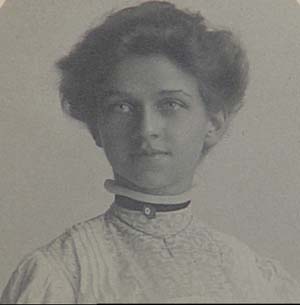
Esther Steele
Image thanks to the Rochester Historical Society
Pension Galilee, Paris June 4, 1918
Dear Family,
My rotten type-writing has doubtless irritated you before this so I wont waste space in apologysing (sic). Even if I am rotten I greatly enjoy using the thing. Fletcher says I could get 200 dollars for it anytime here but I like it too well myself to part with it.
I can easily imagine the sensational head-lines in the papers at home—especially the Times Union—about events here in France. Of course about the Drive you know a great deal more than we do. We do know that the Germans are in the neighborhood of the Marne but it is astonishing how little real horror that occasions in the people right here on the spot. In the former battle of the Marne I used to imagine vividly the consternation of Paris and the crowds of people evacuating the city with Lares and Penates tied up in sheets, trudging along on foot and weeping and wailing in true refugee style. Instead of that the restaurants are still gay, the shops are full—nobody mentions the evacuation of Paris except a few hysterical Americans. Like the giraffe, “there aint no such animal.”
Raids are the simplest little things you ever knew and I am in a position to know because we have had a great collection of them in the last 2 weeks—every night but one for 11 or 12 nights. Only a few of these are worthy of the name—some are almost false alarms and I regret to say that I slept through the most spectacular and most noisy one that we have had yet. Fletcher said he did the same. Evelyn and Mary were on night duty out at the hospital and they said it was a wonderful sight. Search lights and shrapnel lighting the sky above the city for an hour or so. The sick boys at the hospital—all from the trenches, some of them directly and others after stops in other hospitals—are too funny about the raids here in Paris. They never cease to grumble about the siren that gives the alarm, saying that they can stand anything up in the line—shrapnel, barrage and all other noisy and death-dealing devices—but they cannot sleep through an alert in Paris. It is an alarming sound but I am getting acclimated.
June 24, 1918
I had forgotten how big and strapping American are. They are splendid physical specimens but hard to move in bed and splendid swearers too when they come out from under ether. They groan when they see the French wine pitcher coming but hail the milk pitcher with cheers. It is wonderful to be taking care of our own boys.
une 27, 1918 5 Rue St. Louis
Dear Family,
I spend a great deal of time reflecting on the impressions of the War gained by different people under different conditions. And I cannot decide which gives one the truest impression—the distorted and sensational headlines and elaborations of the American papers combined with imaginative conceptions of those who are not on the actual scene; or the calm and retrained news in the papers here and the stories of the wounded and other people right down from the front lines. A head line in the Times Union that the Crown Prince’s Army is marching into Cantigny is a thousand times more terrifying than the tale of a wounded American soldier suffering from shell shock from the concussion of a shell that “got” his pals, who helped hold the line against the Crown Prince at Cantigny and who you feel will contest every foot of German advance until it is too late for the boche to profit by whatever temporary advantage he may have at present.
A wounded Marine suffering from shell shock, with round eyes staring as they always are in that condition and extremely nervous so that he talked all the time, told me that very thing in regard to the front line trenches. He was telling me all about a certain famous battle which I’ll bet drew whole front page head lines at home (and deserved them too) and finally he said reflectively “It sounds pretty bad when you talk about it here away from the line. But when you are up there it is not so bad. Fellows sit around talking just as they do here and its all part of the game.” I have a feeling I have written you this incident before but it made a great impression on me. It seemed queer to me at first that every man who came down from the front did not have some mark about him to show what he had been through. I thought he ought to look differently from other ordinary mortals and act differently. But he does not—that is, the regular man on the line. We all know of cases where great changes have taken place. For the most part it seems to simplify their philosophy of life and death and pleasures and such things.
June 29, 1918
Bath day on Wards A & B and it is funny to see what a party the men make of it. Everything they do is a party. The men are French on these particular wards……all the agile ones help the helpless and there is much nakedness and much scrubbing with jokes and laughter. They always wash their feet first
July 14, 1918
We had a wonderful party on the Ward in the afternoon. All the blesse who could came in from other wards and all the nurses and doctors. We play games and sang and shouted together. Dr. Osmun played his mouth organ for us to march to in Musical Chairs until he almost dropped with exhaustion and in Going to Jerusalem Gustav won the prize after a close contest with Helen. When we formed a circle there was a great crowd—Americans, English and French, doctors, nurses and orderlies, amputees and cripples with casts and slings and crutches. I never had such a good time.
Then Renaud, flat on his back, played the Star Spangled Banner on his flute and we all sang with him. Then the Marseillaise and how they did sing, all the bed cases lifting up their heads to shout—Francis, Grandpere with his leg amputated way above the knee, Bebe who has the Croix de Guerre, and all the others, shabby, child like and gay, these brave soldiers of France.
In the evening we had a perfect supper party at the Nurses’ Home for the Canadian officers, playing games afterward and later dancing and it was gay with Headquarters Red Braid and candle-light and flowers and everybody dressed up. Past midnight when we were singing someone called, “Come out and hear the guns!” We went out into the court. There was a great throb and thunder of bombardment, a horrible and in a way a magnificent roll of sound, a steady roar of tremendous magnitude. We went back sobered to the house and sang our national anthems, French, English, American and O Canada, then joined in a circle and did “Auld Lang Syne,” marching around. Then good-nights. A few of us stayed in the garden for a while in the moonlight to listen to that dreadful surge to the northeast. All night long it continued and nobody slept much.
August 1, 1918
As Mary and I passed the billet for Canadian privates today on our way to work we looked through the red curtains of the open kitchen window to see what we could see. Then we stopped and leaned on our elbows on the window sill. For on a table well out of reach were 12 delicious looking pies. As we were leaving with a sigh, a Canadian came up behind us on the street, grinned when he saw the objects of our admiration and stole us a pie! We hid it under Mary’s cape and went on our way rejoicing.
August 8, 1918
The guns never stop. I spent my time off in the garden and there was a constant rumble and thump off in the northeast like the stamping of mammoth horses in a great stable or the slamming of gigantic doors.
— Esther Steele
Vancouver April 10, 1918
Well, I am a real soldier now and training every day. We have been training for the last two weeks and we go on an all night hike tomorrow night. Training at present is mostly marching and gun practice. A little later we will go on the rifle range.
— Private William Elbert Carr, 318th Engineers
Ft. Hancock, NY March 18, 1918
Dear Polly,
Everything at the fort is the same as I left it. I was in bed at 10 p.m. last night and I missed my dolly at my side. But never mind, pet. When this war is over, we will make up for lost time and will never separate from one another.
Well, dolly, take good care of yourself and take in some good shows and don’t sit home and worry as you know worry wont bring you anything.
March 19, 1918
John and I was to the show last night and they had a couple of would be actors and actresses. They were so punk that the boys just had to laugh at them. The guys were saying that if they couldn’t bring anything better than that around here then they should bring nothing.
Fort Hancock May 6
When I got in the barracks, Joe Goldstein was still awake and he says well, Henry, I was waiting for you. Did you bring anything good to eat and I said sure and I opened the box that ma sent and it contained those mondel cookies that ma makes and a large box of assorted chocolate covered nuts from the Asters and a box of the large jumbo bleached salted peanuts from Sibleys.
July 14, 1918
Our company was paid this morning and all the boys are rich again. They certainly do like the bugler when he blows pay call and that’s about the only time they do like him as when he blows other times, it means “wake up” “work” or call to quarters which means go to bed.
July 27, 1918
The boys are playing the Victrola now. We got some new records from the YMCA yesterday and we play them all week and when we return them we get new ones. Some of the records we have here I heard home and it makes me home sick when I hear them but if the allies keep up the good work they have been doing the last couple of weeks I think it wont take very long before we will be back home.
Monday August 19, 1918
Joe Goldstein received a bunch of Rochester papers today so I will get a little home news from them. It looks good to see a Rochester paper again even if it’s a couple of weeks old.
Saturday morning I was sitting in front of my tent whistling the song Sweetheart from “Maytime” when I received your mail and in one of your letters you wrote that you bought the record by the same name. Now isn’t that strange that I should be whistling the song when I received your letter?
Sunday August 25, 1918 (near one of France’s largest cities)
Max Meltzer and I had dinner at the YMCA after which we went out to look the town over……..walking along one of their main streets, we came across a Jewish temple. It is a large building built of white cut stone with a large court in front. We walked in the place and met the janitor who showed us through the place. I was never more surprised in my life when I walked inside and saw how beautiful it was. It has a large auditorium and balcony and marble stairs leading to the oran kodash. The janitor who is also Jewish opened the oran kodash for us and in it was 12 cit-a-tor-ahs just like the ones we have in our shool. They have a large bim-me in the center of the temple for the cantor and his choir and they also have a beautiful large organ. It certainly is a nifty place all the way through. The rabbi of the temple whose name is Schwartz is out of town………we were told by the janitor that the rabbi wants all the Jewish soldiers to come there for the holiday and we promised we would if we could get off. He will see that we will be taken care of. Each member will take one or more soldiers to their homes for meals, etc. I think that is very nice of them. The rabbi speaks English and Jewish.
October 17, 1918
Dear Polly,
I received your letters and also the pictures you sent me……..you certainly are getting fat from the looks of the picture.
— Private Henry Nievert, 57th Artillery C.A.C. supply company
March 26, 1918
Dear Sister,
Received your letter also the handkerchiefs and candy before I left Camp Devens and the calendar you sent is just what I wanted.
John Knapp was in the same company with me in Camp Devens, also all the other Rochester fellows but down here we are all mixed up. I am in the military police now and start to do duty tomorrow.
Tell Hilda that I am waiting for that box of bull she is going to send, tell her to fill the box right up because it makes such a delicious desert fried and smothered with onions. The feed down here is fine, get some kind of pudding with every meal, get beans about once a week.
With best wishes to all
From August
Somewhere in France
July 8, 1918
Dear Sister,
I thought I wrote home and told you I was not sea sick on the way over. I was on the same boat with Joe Becker, he died 2 days before we landed and was buried at sea.
The German artillery is firing at us very day but they have not hit us as yet. We got some good cooks in our company. We have flapjacks about three times a week for breakfast and a lot of beef stew for dinner and we still have some kind of pudding every day, mostly rice pudding.with raisins in it.
Well, I will have to close as we are going to move tonight and I want to get a few hours sleep.
From your brother
August
August 3, 1918
Dear Sister Mary
We are moving to a different section of the country now, hiking nights 18 to 20 miles with a pack on our backs that weighs about 80 pounds. You are mistaken if you think I have not been up to the front. We were in the trenches three weeks in the Alsace Lorraine sector.
I don’t know where we are going. The officers don’t tell us but I know pretty near all the roads in France I have done so much hiking. I had a train ride for two days before we were in the trenches and I think we are going to have another one.
They have a lot of old buildings in France. I was in a bunch that was built in 1650 and there are a lot of barns and houses that are from 100 to 200 years old.
We are having fine weather over here for the last two months but at night when a fellow is on guard it is chilly and we all wore overcoats until a week ago when they took them away from us and some of the boys are wishing they still had them. I got to go on guard tonight. Guess what I am going to guard? A bar-saloon. The water over here is not very good so we are allowed to drink beer and wine and every time we get to a town we are only in it a few hours before the town goes dry. They cant make it fast enough for us.
From your brother
August
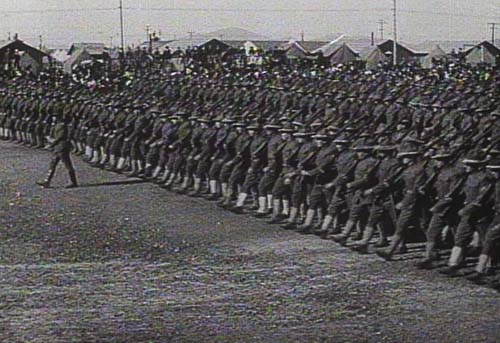
August 25, 1918
Dear Sister,
The towns we are near now are all shelled to pieces and we don’t get time to go to church. Last Sunday we were digging trenches and I am writing this letter during the time they give us for a little rest between digging. We got a priest who travels with our regiment but he cant be with all the companies on Sunday. Before we went to the front he gave us general absolution and most of the boys went to communion. I went and now we have to go to confession as soon as we get the chance but the chance has not come yet and three weeks have passed already.
The German people are all sick of the war. We captured a German while up at this front and he says they are all ready to quit but the money men keep them going. They are being beaten all along the front and are tickled to death if they get captured. The one we captured was just back from a two week furlough but he said he’s got a better one now and wanted to know if we were going to send him to America.
Juzencourt, France
January 15, 1919
Dear Sister Mary,
I wish I was in Heckens boots and was discharged. I am sick of this job but cannot quit and now that I am a corporal I am getting disgusted with it more every day. A fellow has to take too much hell. If one of the fellows in his squad does something wrong, the corporal gets called for it. I wish I was a private again.
January 27, 1919
Juzencourt, France
Dear Sister Mary,
We get regular meals now that we are away from the front but I could eat more a lot of times. I went hungry a lot of days when the war was on, some days only one meal and that a cold one. We went sometimes for 2 and 3 weeks without a hot meal. One day they handed me a biscuit and said there is your dinner.
— August Roesser
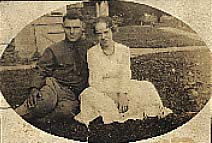
Pfc. Henry Cornelius and Marie O’Keefe
August 21, 1917
My Dear Henry,
I hope these few lines find you well and happy, just as happy as you were when I saw you Saturday and as you were all day Sunday. We are well here. I hope you and Bill don’t see the guard house for being late Sunday or maybe you werent late.
I felt so sorry for Charlie after the train pulled out. He cried so hard, I thought his heart would break and when Emma saw him cry she began and then that made Margaret feel bad and she started. I had some bunch on my hands. I kept up the best I could and I guess some of them, especially Margaret have the idea that I do not miss you just because I didn’t cry but I think my heart was too near broken to cry but I thought if I could cry I would feel better, but tears would not come until Monday noon when I was in church, but I think those were tears of joy and thanksgiving not of sorry, because I was thinking of you and your going to Confession and Holy Communion. You don’t know how happy I was Sunday morning. No one does except myself. All my prayers for the last two years were answered. May God bless you for doing it and I am sure He will do it, dear. My prayers from now on will be in thanksgiving, also for your safe return to us and that you will be a good boy. Try to be and I am sure you will. Take any good advice given you and keep out of bad company for you know that is the worst thing of all. Say your prayers each morning and night and before going to sleep ask God to forgive you any sins you may have committed and then if anything should happen (but I am praying nothing will) you will be prepared. Don’t think I am lecturing you or bawling you out for I am not but these thoughts came to my mind and I had to express them. God bless you and take care of you is my only wish.
Loads of love and kisses from Marie to her soldier boy.
Marie.
P.S. Some parts of your letters are very sad but the postscript you put on the last one nearly broke my heart. Don’t you ever think I will forget you for I wont. If you think of me one half as many times as I think of you I will be real happy. There is not an hour of the day passes without a thought of you and sometimes a prayer for your safe return to your Marie.
October 25th, 1917
My Dear Henry
I havent much news for you this time but I hope these few lines find you well and happy and that you are enjoying yourself. Everyone here is fine. The weather here has been pretty good up to this week and it has rained every day since Monday. We had snow twice, once on Columbus Day and once on Friday of last week but neither times very bad.
Our Red Cross work is coming along fine. It is very surprising all the work that is being done. The Second Liberty Loan is going through fine. John took up a bond and I am thinking of taking one also. If all the money that has been and is being raised and all our brave boys who are fighting or training to fight does not win this war for us I cannot see what will but I feel sure we will win and win bravely. Keep well and be a good boy and we will all see you back with us again soon.
Say, have you found a little French sweetheart as yet, or am I your little French girl as you said the day we were in Syracuse. Ha Ha.
Again closing with lots of best love, luck and kisses from Your Little French Girl with an Irish name.
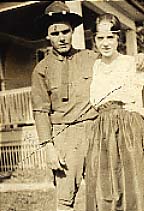
Henry and Marie
November 17, 1917
Oh say I came near forgetting it. Sufferage won in New York State on Election Day. Just think, we vote next Spring. It doesn’t interest me very much. Edgerton was re-elected Mayor and the rest of the bunch wouldn’t interest you a whole lot. You always said I was boss so now I am since “Votes for Women” has been passed. Ha Ha.
December 15, 1917
I could not help writing you these few lines today. Do you remember what the 15th of the month is? Five months ago today you left Rochester and I am praying real hard that in five more months we will see you back safe in Rochester again.
I have a new hobby since you left and I bet you cant guess what it is. I am saving all the war pictures I get either from newspapers or magazines and I have over a hundred of them. I am also saving patriotic poetry and I have a few pieces which appeal to me greatly. One is “Soldiers come Back Clean” which so nicely describes the dangers to mind and soul and asks our boys to be real good boys and comeback to us so.
Here is something else which might interest you. 494 of Rochester boys left today in the draft. Just think about _ thousand. They left in three divisions. The boys go to Fort Hancock somewhere in New Jersey. Our chauffeur at the office left with them.
At present we are having a Red Cross campaign here. I don’t know just how much they have to get but I hope they get it all. I know they got my dollar for it goes for a good purpose.
Say I hear a lot of the French girls. Give me a good idea of them will you. I suppose you have found a lot of them by not, or maybe not.
Well, dear I guess I better close or the censor of this letter may get angry at reading so much. Write me whenever you get a chance as your loving letters help to cheer me up. Will now close with loads of best love, luck and kisses from Little (BIG) Marie. P.S. What do you think? Everyone tells me I am getting fleshy. I cant believe it, but maybe I am. I hope so at least.
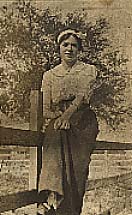
Marie O’Keefe
January 19, 1918
My Dear Henry,
Here are a few more lines from Rochester. Hope they find you real well, the same as I am. Everything in Rochester is about the same, only we are still without much sugar, and are now without coal. All the factories have shut down for 5 days starting Friday A.M. the 18th and opening again Wednesday A.M. the 23rd and then everyplace, stores, and all are to close each Monday for ten weeks, just think to save coal.
Sunday, oh it was so slippery, the walks were just like glass and the wind blew terribly. After dinner Sabina and I went down to the hall to set the tables for the banquet the club boys gave Gus. After supper we went back again and I wish you could have seen the dining room, all American flags, etc. the center table represented the Army and Navy, with a tent, ambulance, submarine, gun and Red Cross nurse, of course these were only toys, and places were draped with flags for the other nine boys who are in service. We had dancing, singing, etc. but I didn’t dance for I was too tired. Everything was fine but I suppose I hadnt ought be telling you all this for it may give you the blues but never mind when you come back I will see that you have just as good a time as anyone else and maybe a better time, what do you say.
I was over to see Grandma and Aunt Sarah at night and they were also asking for you even though they don’t know you. Grandma says she hopes you find the Kaiser and if you do to bring him back to her.
April 6, 1918
My Dear Henry
Your aunt went to a meeting so the three of us had supper together and after supper Celeste’s beau called her up and said he was coming down but she told him we were going to the movies—-one thing I’ll tell you I did not enjoy the pictures in the least. They were terrible. “The Zeppelin’s Raid” was the name of it and if war is really what that picture showed I certainly ask God to put an end to it real soon and bring Peace to the world. You may think I am foolish but I cried for fully a half hour and I don’t know when I cried so much. I nearly broke my heart
May 29, 1918
Hello there Henry,
After supper I was telling my fortune and the cards said I would get a letter and some good news soon, and believe me when your letter of April 17th came to me yesterday the 28th it was good news.
Now I cant tell you how happy I was when I got it. The mail man handed me the office mail and said here is one for you from “Over There” and I could hardly believe him for I came near giving up hopes of getting any more as it was nine weeks ago and a day since your last letter came. I sat down at my desk and to tell you the truth was afraid to open the letter but just the same I did and was so glad to hear you are so well and I assure you we are all well too. I am also so happy to know that you were on the firing line and that you came back safe.
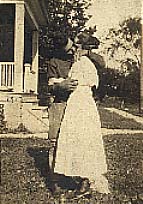
Henry and Marie
November 13, 1918
My Dear Henry,
Well, here is the excitement I was going to tell you that happened on the date of your last letter November 7th. About one o’clock in the afternoon an EXTRA came out that PEACE was DECLARED and you should have seen this town. The news spread like fire and before 2 o’clock every place in town was closed up and Main Street a wonderful show of people, parades, bands, noise and everything imaginable. It came so suddenly it was hardly believable. I went back to the office after lunch and watched the crowds from the window until I could get a car home. Well, just before going to bed Dad came home and said he heard that the news of Peace was a fake. That of course took all the good out of us.
Well, the next morning, Friday the 8th, the truth came out. The papers were published and believe me Rochester was a real disappointed place. Business went on as usual but we all felt the end of the war was near.
John wanted to bet with me that Germany wouldn’t sign the Armistice but I didn’t like to take him up for you know those D—m Germans maybe wouldn’t have and I’d have lost my money but at 4:15 A.M. Monday morning I was sorry I didn’t take him up for the news that the Germans had given up struck town. This time it wasn’t a fake. I woke up and heard the whistles and bells and thought it was 6 o’clock. I didn’t hear Dad around and was just going to call him when the woman next door hollered Hurrah and with all the doors and windows closed it sounded like Help. Mother heard it the same time I did and we both jumped out of bed, thinking her house was on fire or something but when we opened the door, she hollered Hurrah again and with all the noise we knew that the end of the war had come at last and that all our prayers were answered.
— Marie O’Keefe to her beau, Pfc. Henry Cornelius
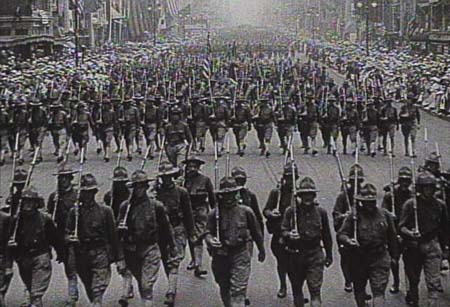
July 3, 1918
My Dear Mother and Father,
These days are the most vivid and eventful ones I’ve ever experienced, of course……think of the most exciting moment in your life and multiply it by 1000 and you see what I have every moment of the day.
Our nerves get rather unstrung at times. This savage game is quite a box in the ear. The nearer a man is related to a brute, the better he stands this game. (Penny was killed just a few weeks later)
— Vernon Penny
September 9, 1918
Mr. George Penny, Rochester, NY
My dear Mr. Penny,
I am taking the liberty of writing you, as from the NY times yesterday, I noticed an account of the death of Vernon Kellogg Penny.
My son, Harry D. Pixley, is Lieutenant in Headquarters of the 27th Division and at present is detailed at the nearest railhead to the 27th Division.
Apparently, your son was in that same company as I had a letter late last week giving me an account of your son’s death. I am giving you below a copy of what he had to say. My son’s letter reads in part
As I am away now from the town when the bomb struck pretty near to us, I can tell you about Vernon Penny being killed. He was one of my motor drivers. The Captain and another Lt. came into town in the car and got out of it by my billet at 12 a.m. and then Vernon drove it into an alley 4 houses below mine. The two officers woke me up…….just then we heard the sizzling of the bomb. The Captain pushed Peppard into the hall and followed. They no more than got inside when I was thrown up against the door jam going into my rooms, the Captain thrown to the floor and Peppard hit in the head by a flying door panel.
The house had the entire roof torn off and every window blown out. All this was from concussion and the houses around us fared the same.
I was barefoot and in my pajamas with a steel helmet on. You can imagine my looks………then my orderly came in terrified, saying the place he lived in was destroyed and the car ruined. Not seeing Penny with him I ran down the street with the Captain and we found the house where we messed in ruins and the car a complete wreck. In front of it 5 feet away two bomb holes big enough to bury the car. I looked under the car and in the debris but finally found Vernon about 20 feet away in the cool green grass, lying silent. He never knew what pain was. He certainly did his duty and his mother should be proud to think she had a soldier ready to do his duty for his country. Just before I left town I went out with a sergeant and planted some flowers (annuals) on his grave. It was the only thing I could do.
(Vernon Penny, East High graduate, died July 24, 1918 at Arneke, France from the effects of a bomb that had been dropped by a German plane)
— George Pixley of Utica
November 5th, 1918
To Commanding Officer, Base Hospital 13, American Expeditionary Force
Dear Sir,
I am writing to inquire about the condition of my son, Private John E. Harmon, Company C, Sixth Engineers. He was injured July 16th and has been in Base Hospital 13 since that week. He writes home very frequently but he gives us so little information about his wound that we are at a loss to understand why he has been in the hospital so long. Any information or explanation which you can give would be gratefully received. John is our only son and his father, who is eighty four years old, is trying to run the farm without him during the war. You can imagine from this how anxious we are to hear about his condition.
Yours sincerely,
Marion Harmon
World War II
November 29, 1942
My brave Tony,
Believe it or not, I declined an invitation to tonight’s concert in order that I might pay “Hello” to you—listen to our mutual friend Dorothy Thompson at 9:45—and read a bit in Herbert Agar’s :”A Time for Greatness”—all of which makes a pretty nice Sunday evening especially when preceded by lobster newburg plus all the trimmings in congenial company and a couple of lovely Paderewski recordings on a new Stromberg-Carlson—wouldn’t you say so?
We received your greeting for Thanksgiving and thank you. I hope your was a good one—very different from any you’ve spent before, I’ll venture. I did not make the customary pilgrimage to the farm—one doesn’t go far and back on three gallons of gasoline.
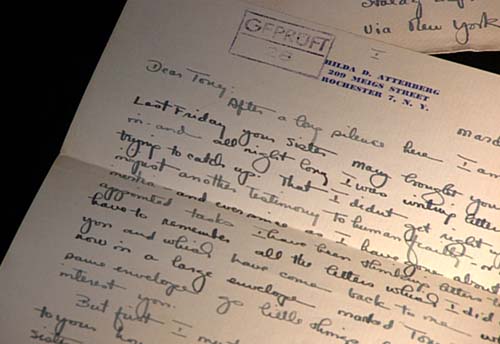
Letter from Hilda Atterberg to Anthony Aratari
January 9, 1944
My Brave Tony,
Writing to you today is an act of faith—a strong faith—for yesterday’s paper said that you are missing in action. I read and I could not believe, and though your whereabouts are unknown somewhere I know you must be holding fast to life, or so it must be if the wills of those who hold you most dear have power to keep you.
— Hilda Atterberg to Anthony Aratari
January 30, 1944
Dear Tony,
They have told me…..in the car as we were driving home from church. It was such a beautiful morning with a brand new winter-blue sky that was dusted here and there with fluffy white clouds……a sky perfect for flying……you would have loved it.
Father was saying that he met your dad quite by accident in a grocery store yesterday afternoon. He noticed a similarity about the white-haired old man as though he looked very much like someone he knew, and when he overheard him mention the word “airplane,” he went over to him and introduced himself. Father was right. He was your dad.
I asked father if he had heard any news about you. It was then that he said quickly: “Yes—they say he is missing.”
Missing?
I was looking straight ahead. The windshield was misty and the sky had turned suddenly into a sea of blue. Missing. I fixed my gaze upon a cloud until I couldn’t see it anymore. I was not going to bow my head—no—let the tears come—you were missing—couldn’t everyone understand! You were missing.
I looked down at the turquoise bracelet you sent me from San Juan. I looked at the miniature suns carved on it—two of them, one on either side of the turquoise. I looked at it and everything you ever meant to me welled up in a great blur that hurt so much.
Tears fell on the sun, Tony, but it has not stopped shining. You will always be writing to me, my darling, always!
Frances
— Frances Cruikshank to Tony Aratari, POW
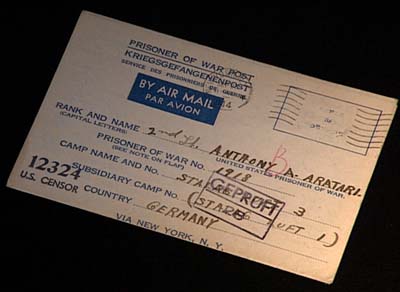
Prisoner of War Post to Tony Aratari
January 30, 1943
Camp Young Desert Training Center, California
Dear Mother,
I suppose you were surprise to hear I was in California. I was too when I got on the train. The place is not so bad after you are here awhile. One has to dress carefully as days are warm and nights cool….
We do not wear our olive drab (OD) in camp—just when we go to town. Here we wear the usual army fatigue clothes which are green in color. This is really roughing it here. Cold water, straw mattresses, folding cots, no sheets, field ration dishes for dishes and tents. But I don’t mind it . one appreciates civilian life all the more after this is over with.
March 12, 1943
Los Angeles
Dear Mother,
John and I came in yesterday morning on a two day pass, which they gave us very willingly. We hitch hiked the 160 miles and had marvelous luck. Everybody seems to be so very friendly……in California, hitch hiking is the thing to do since trains are so packed these days. Large signs all along the highways say “Give the soldiers a lift”. We passed through many interesting places. At Pomona we saw the orange center of California. Miles and miles of orange groves—and sad to say due to no help they are rotting on the trees.
This is a marvelous hotel—for $1.25 apiece we have a large room with twin beds, bath and all accommodations. Again, they give soldiers half price.
The USO is very large here. The people in it just seem to feel they cant do too much for you.
April 3, 1943
Dear Mother,
It gets me the way most fellows waste their time in the army—so few read—instead they lie around in their tents (during off hours) and either talk nonsense or shoot dice—it is also startling……to see that our educational system has failed to instill in them the necessity of making better use of their time. John is an exception and I am so thankful we are in the same tent.
August 24, 1943
Camp Pickett, Virginia
Arrived this morning at this camp after 4 days and 4 nights of train travel. The trip across continent was very enjoyable.
Pullman accommodations were excellent on train. Cooked every other day, same as in camp. The mail or baggage car was used as a kitchen. Some fun, but some job to cook and prepare food rolling along at 60 per hour—is no cinch. Gravy always ended with most on the floor. A large staff was kept busy but thank goodness no casualties.
January 10, 1944
“Great Britain”
Dear Mother and Dad,
Would give one pound ($4.00 to you) for a piece of your apple pie plus some of your extra thick whip cream and oh yes! a cup of real American coffee. British coffee is made with hot milk and different from ours.
Yes! we are in tents but am used to them by now. But if anyone mentions tent to me in civilian life, his “name will be mud”.
Cherrio and loads of love
—your loving son,
William
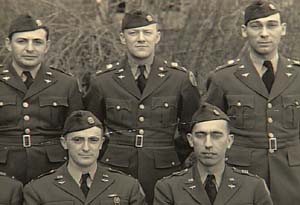
April 17, 1944
Dear Ted,
I never find time hanging on my hands and as I get ample time off—make good use of it—a thing which the average GI does not do. There is no doubt that the near future will be an experience worth relating to our posterity. The American soldier here refers to everything or anything British as limey. They don’t resent it but the average American usually says it in such a belittling attitude. The colored soldier at times offers a problem—in as much as they do escort some white girls. Which of course is to be expected under the circumstances.
April 30, 1944
As a favor to me would you send a small box of candy, gum or any other miscellaneous thing to Betty, the five year old daughter of the Davies. They have been so friendly to me and the little girl who is so cute is like so many children here, not able to see much of these things. In fact any five year old child here does not know the meaning of street lights, lighted windows at night, bananas and even grapefruit, ice cream and quantities of sweets such as we in the states.
October 28, 1944
Somewhere near Verdun
They say Mars’ name is “mud.” Only when everybody on earth is made to realize that mud instead of trumpets and banners is the true symbol of war is the world likely to have any real valuable peace. Mud is everywhere here in the rural areas of France. The roads just ooze with soupy mud. French roads are paved and well made but the constant flow of traffic of huge trucks, etc, plus the daily rains has made mud supreme everywhere. Consequently, I do little walking about
November 7, 1944
France
Just read of a sinking of a transport recently—bound for Iceland—many soldiers lost their lives. War is sure hell at times. I wonder if it is worth the price—the next decade will tell.
March 15, 1945
France
Have you seen many news reels lately at the movies? Saw one last night on the port of Le Havre, one of France’s greatest ports, which I saw from the ship in 1938. Now it is a mass of ruins. Personally, I think the devastation on the cities and towns here is terrible and the cost of human life so great, that I dislike even to think about it. It greatly annoys me to listen to many of the news reporters on the radio. They ballyhoo devastation like it was a football game. This war has to be actually seen and experienced to realize the horror of it.
April 27, France
On the train to Paris—there was a Russian officer (a young Lt.) who sat in our compartment. He had with him a young Russian boy of 12 years age, who he had picked up somewhere in France and who was liberated from a German labor camp in Germany by the Americans. The boy’s mother and father had been murdered in front of his eyes by the Nazis on their farm in Russia two years ago. What a sad thing that was. It seems that all these atrocity stories about Nazi camps are all true. I have spoken to several front line fellows who have seen them—they say the sights are horrible—dead and dying stacked like cordwood—well, I wont repeat anything more because it is too horrible to talk about. These fiends who pose as Nazis (and that just includes the fanatics) should be lined up and shot with no buts or ands about it. I say give all of Germany to Russia. Was talking to a French lady the other day who told me her only son has been in a labor camp in Germany for over 2 years and seldom can he write. That sort of thing is all over France.
France—April 30, 1945
We are quite interested in the forthcoming peace signing of Germany. But among all here there is no outward signs of enthusiasm. Perhaps there may actually be after it happens. But for many—peace will just emphasize the loss of those who will never return.
Thursday—May 3, 1945
History is sure being made these eventful days. But somehow VE day to me will be a day of prayer and thanksgiving rather than celebration. I have experienced enough mud and blood in the past to know what being thankful really means.
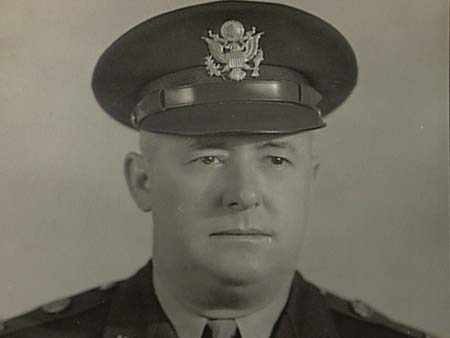
Near Verdun, May 20, 1945
When I read of the racial prejudice that is occuring in the States, I get most heated up. Especially the Japanese question. Why good American born Japs should be treated thus any more than American born Irish or Danes is something most unfair. The evil few American born Japs have been weeded out—so why should the rest be treated so by other American civilians. We must practice tolerance and undersanding—otherwise another war will be in the making.
May 26, 1945, near Verdun
Our medical groups here are all colored, that is the doctor, dentist, both Captains, as well as all the support personnel. Visited the dentist the other day. Had two small fillings. He is a very tall, distinguished looking colored person. An excellent dentist. The doctor is also. There are many of our fellows—a great many—who are prejudiced against the negro. About a week ago, one of our fellows ordered a colored soldier off the floor of a French dance—a great fracas nearly started. The next day—the colored officers went to the Colonel about it—but it was smoothed over. It is a just another example of ignorance and intolerance on the part of an American. Personally, I know of colored people I would rather have in my home than I would some white people. On the other hand there are bad colored soldiers as well—rape cases in France prove that—but education and tolerance on our part so the colored person can raise his or her status or level of education and opportunities will eventually eliminate this sordid situation.
June 11, 1945
D-Day, June 6th was a double anniversary for me. I have so much to be thankful for, that day was one of everlasting gratitude for me. When I think how I was bounced about in the English channel from June 3rd to June 6th on a 2×4 LCT with no protection against the rain or weather—seasick beyond words, then faced with the assault landing on the worst part of East Red section of Omaha Beach. We were shelled even before we landed—well—I have plenty to be thankful for. We were attached to the 336th Combat Engineers of the 5th Special Amphibious Brigade and at the time under the 1st Army. We are not now though. A piece of shrapnel went in my shoe—but did not touch my foot—another miracle!
— William Surrey, drafted in 1943
September 7, 1942 Ft. Bragg, North Carolina
Dear Dad,
We had two lieutenants get married. They had a parade and a lot of nonsense for them. I had to drive the band that played for them. After the marriage they went to the officer’s club and really celebrated. By suppertime I don’t think there was one sober officer in the regiment. It was disgusting. Speaking of drunken officers, a week ago last Saturday I was at a lake nearby. I saw a colonel that was so drunk he couldn’t stand up. That’s the kind of men that’s going to lead us stupid privates into battle. A colonel is as high as they can go without being a general. I suppose that was the story at Pearl Harbor.
I am going to take out $5,000 in the government’s insurance. I never even think about anyone collecting it because I know they wont but I’ll take it out just the same. In case I die the government pays off the beneficiary in monthly payments. So I am going to name Helen or Brenda as the beneficiary. In case anyone collects and you need it I want you to have it. But otherwise I want it to go to little Brenda. I suppose in about 5 years I would laugh at this letter but I guess it best to make definite plans for the worse…Don’t forget to pray for me Dad. I know your prayers will go a long way.
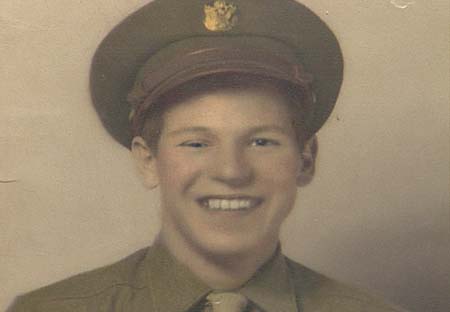
November 26, 1942 French Morocco
The French people are glad we are here. The Germans were about starving them. The French soldiers are working with us. We have good food. Most of it comes from cans but its OK. Today being Thanksgiving we had turkey for supper. I suppose you had quite a meal at home.
The natives here are Arab. They are about the poorest people I ever saw. They go crazy over American candy, gum and cigarettes. The French people do also because they haven’t been able to get any here. We have plenty of that with us.
February 8, 1943 North Africa
Sunday afternoon Martha Raye came here and put on a show. It was very good. This afternoon we had a French follies. It was pretty good. This is the way wars should be fought.
April 9, 1943 North Africa
From your letters, I imagine this war is a lot harder on you people than it is on me. You must stop worrying. I’m OK and doing fine.
That’s fine of dad to want to saw lumber and build a house when I get back but I’ve slept on the ground in a pup tent so long that a dog house will do me fine. I’m not complaining though. I never was the type to worry and be certain I won’t start now.
September 23, 1943 (North Africa)
It hasn’t rained in several months but when you are living outside all the time, you hate to see it rain. We are getting a few fresh potatoes to ear. They really taste good when you haven’t had any in nearly a year…I don’t have any hay fever now. I would be suffering if I were in Geneva now.
Love,
Russell
(sent to his dad and stepmother(?) in Geneva
May 16, 1945 Austria
Dear Dad & Grace,
It seems the more spare time I have, the less writing I get around to do. But I really am busy with a little light duty, movies, sightseeing trips, ball games, etc.
I was very happy to have the war over with. After so long and hard a struggle, peace seems really strange. It’s the kind of strangeness that I can stand plenty of. I guess the Lord was really good to let me through the war without so much as a scratch. A good many times in the past I thought I might never be around to see victory but here I am OK. Capt. Frederick Meyer Friday afternoon 1610 6 March, 1970
We went over to their main military hospital opposite Cue Quan y—“Cong Hoa” hospital. Again, may I say “don’t ever let anyone tell you that the Vietnamese haven’t suffered in defense of their country. Several times, tears came to my eyes as I went through the paraplegic ward, the amputee ward, etc. I stopped by many beds to chat with the aid of some interpreter—what’s the problem? How long you been here? Where you from? Etc. By their standards, it is about the best they could expect to do—and not bad by our standards either—quiet, clean, ventilate, some TV sets here and there, etc. Used to be French, of course. They all seemed to respond to my interest, no matter how bad off—a cheerful word, a good luck sign (thumbs up), a salute, sign language. One of these days, I’ll drag a newsman through and see what they say then! If I can get them out of the bars in their hotels (my suspicion).
— Russell Smith
April 3, 1943 North Africa
Darling the dear old desert is changing where we used to be and where part of our outfit still are all of the debris is cleared away. I take it back—I mean old trucks and destroyed tanks. They are salvaging everything so when I bring you over here there wont be nothing but junk strewn through the desert. Now don’t get me wrong, there will always be enough there to make your eyes pop out but you wont be able to see all of the trucks and tanks. All of the airplanes are still there because when they are shot up there is not very much left. I have seen lots of tanks that have been shot up and then caught on fire and burned and you could still see parts of the men still in the tanks but they have been moved back and forth so much that it is hard to tell how long they have been there. In battle it is impossible for the men to find all of the dead and sometimes they miss some. Our old home does not smell as bad as she used to when we were there. You see around each airfield and landing ground there was usually a great battle and many men were killed and about half the time they are in a hurry. They bury them where they find them. So most of the graves are shallow and then the rats dig in and you get the best odor that you ever inhaled
Friday June 11, 1943
My Darling Wife,
You get so damn mad at the wind around here that you could go crazy. If you don’t put a weight on everything, it blows away. Yesterday, I had a knife on my note book and it still blew away and all my stamps were in it. Boy, you could blow your top at times because it never stops—only at night and that is for about three hours. Even my bed I cover the top part with a raincoat so when I pull the covers up over me at night I wont choke to death from the sand. You should see my bed when I take the raincoat off. One half the blanket is white and the other half is dark.
Thursday, July 8, 1943
My Darling Wife,
Well, I now have a confession to make. You remember how I always said I could take all the heat they could put out? Well yesterday it made me back water and I will now try to explain it to you. It gets plenty hot here but most of the time there is a little breeze from the direction of the sea. Now yesterday she went up to 138 degrees, now that alone is bad enough but now listen to this: a wind of about 35 miles an hour started blowing off of the Sahara desert. Now if that don’t make a blast furnace I cant tell you what would. Darling it was impossible to expose any bare part of your body to the wind for it would burn just like a flame. Men with metal wrist bands and rings had to take them off because the metal burned them. The only possible relief we could get was from wet towels over our heads and necks. The evaporation was so great that it made the towels cool and then we could breathe cool air through them. All the water was almost to the boiling point. It was just miserable and unbearable! They tell us that your body could not stand many days of it. Everybody got sick and all of us got terrific headaches but this morning everything is OK again but we feel like someone beat on us.
Thursday, July 19, 1943
My Darling Wife
Now I will tell you all about the fishing trip that we took the second day we were at the rest camp. It was like this.
There were 21 or 22 of us and we were up at 6:30 a.m. and after breakfast we were loaded in a 2 ton truck and then we started to the fishing country. The road winds through beautiful mountain country with plenty of timber but after a short time you have climbed out of the timber and are above the timber line where the mountains are very rugged and also plenty rocky. After driving about 20 miles we turned on what looked like a cow trail but it was not terribly rough. Now we were getting into some real wild country. After traveling on this path for about five miles we came to a barrier across the road and there were two French soldiers there guarding it. There was a sign on one side which was written in French and read “This is the boundary of security”. From there on, you are on your own because there are Berber tribes from here on. We only drove about 20 miles into the country and the natives are friendly this far. By the time we reached the stream, we had climbed to 10,000 feet. This stream is supposed to be the best known in that part of the country and where it is located it should be because very few people can get to it. It is a beautiful mountain stream that really moves and there is enough trout in it to feed all of Springfield. The fishing tackle that they gave us at the hotel is not very good for trout so we used rifles. We caught and cleaned over 200 that one day. I caught four on hook and line and then I started shooting them myself. I said I wish Toots was here to enjoy the fun. It was sure funny to see everyone with rifles and pistols fishing. It sure would have been a field day for a game warden. We could not see them in the rapids so we had to get them out of the deeper holes. The water was as clear as glass and as cold as ice—we cooked dinner along the stream and drank water from the springs that the water hurt your teeth.
My love is yours forever.
Robert
Somewhere in England, August 30, 1944
My Darling Wife,
George is getting out of hand. He is our pet crow that we have had since he fell out of a tree. He steals everything in sight and then hides it. He flies into everybody’s room and carries things off. We caught him hiding a watch under some dirty sox the other morning. We have been giving him some instrument flying. With this fog as thick as soup in the mornings he gets a lot of time. We throw him out the second story window when there is a heavy fog and so far he has spun in twice. He just cant use his instruments in this fog. We have had him drunk quite a few times. When he is drunk he is a sight. He flies into things and falls off everything he tries to sit on. He goes in and out of the mess hall anytime he wants. In fact, he acts like he owns the place. You might be walking along and he will fly up and land on your shoulder and ride for awhile. He can catch coins when you toss them to him and he immediately hides them.
August 24, 1943
My Darling Wife,
Tell mom I think of her chow every time they shoot the Spam and Vienna sausages to us so that makes it every day. You know that you are going to get one of them during the day but it always keeps you guessing as to which meal it is going to be. Toots, do you remember how I used to like Spam. Well now it turns ,my stomach to see it on the table. We have a picture here that shows the final victory and it is B-17s bombing a Spam factory. After the war is over, they might just as well close up all of the Spam factories.
I am so sorry, darling, when I read where you said that Singer’s wife wrote Mildred that the latest rumor over here was that we were coming home, because Singer is never coming home and neither is (Al?). They were both killed in action. You might know some more of them but I am unable to tell you any more.
Somewhere in Sicily, Thursday November 11, 1943
My Darling Wife
Major Wannamaker and I have bought an Italian radio and it is a very good one. It is small and has five tubes and has a very good short wave reception. I have it on now. you know how much enjoyment that I get out of a radio. Well, I have not changed a bit. I now am listening to a German broadcast. It is a very funny thing over here about broadcasting. Over here, the Germans always have the best programs. Every nite they have one and always play American pieces. The whole program is in English. The announcer every once in a while says the following, “This program is coming to you through the courtesy of your enemy.” As you sit here and listen to them, you think how foolish it is to be killing each other. You see Italian soldiers everywhere and you stop and think that if you had seen them two months ago, you would have killed them and now they are your friends. It will probably be the same with the Germans when they are beaten. Put us all in a room and take our clothes off and no one would know who to try and kill.
Somewhere in England, Thursday November 16, 1944
My Darling Wife
This morning makes us two years overseas. I am glad I did not know that I would be here two years when I left the states or I should have died. That is a long time to be away from you my darling wife.
Last night I went over to the enlisted men’s barracks and took popcorn along and then we had a session. There are very few of the original bunch left. We had a lot of laughs about things we done in the desert. It is a wonder that we are still alive. We were more of a menace to ourselves than the enemy were to us. How we used to go out in the mine fields to look for motorcycles and guns and other equipment gives me the shudders. On top of everything else, someone was always setting an ammunition dump on fire and then we would really have a show.
— 2nd Lt. Robert Uhrig to his wife
Sunday November 12, 1944
Blonde Darling,
Because the censorship has admitted the V-2 rocket bombs—and feeling that publicity would be given in the NY papers to the (Yarman?) claims and Mr. Churchill’s statement, I can tell you that on occasions I have heard them bang off but like in a thunderstorm, rarely close—and these remarkable people who have been through so much worse with the fly bombs and bombing pay absolutely no mind to them.
Monday November 20, 1944
Regardless of what you may hear from German sources, London is not under constant bombardment. Perhaps one—and I don’t recall more than 2 of the V-2 rockets—land in a day and of late they have become more infrequent. None have been anywhere near and I don’t know anyone who has ever seen where they landed but of course you hear them when they burst. Actually, they cause no more damage than a fly bomb…do not get on the nerves for there is no warning and after you hear one its over—and the next will not come for hours or several days. The paper says they are fired from Holland near the Hague so they will be permanently silenced in due time.
As to fly bombs they are practically extinct t.y. (thank you?) and in my five weeks here I’ve only heard one and seen none…….so please honey don’t be disturbed about me for no one here including yours truly is concerned and in fact the risk is no greater or as great as crossing Madison Avenue. People are so casual that no one takes notice during an alert—traffic goes on—business goes on—and shelters are used only by homeless.
Sunday January 7, 1945
Dear Flo-Flo and Fred,
Your Xmas gift was thoughtful to the extreme for I was “scraping the bottom of the barrel” when your cartons of Phillip Morris arrived. Long hours of work plus being away from the home base cause you to reach for a cigarette more often than is perhaps good for you. The supply here—as at home does not meet the demand and I’ve been supplementing with Gold Flakes and Players which give little satisfaction.
The barter value of a package of Phillip Morris is great and I traded two for a fresh egg last week—the first I had had in 3 months.
— Douglas Townson (worked in London to coordinate food distribution/war relief, the Mission for Economic Affairs)
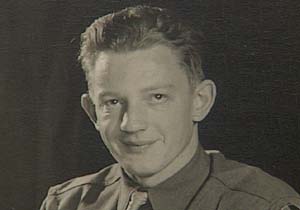
Saturday February 24, 1945
You know that this months and these months are flying by. Pretty soon it’ll be George’s birthday. That means induction proceedings. For god’s sake don’t wait until then. With the time my birthday came I didn’t have much of a chance to do anything but you have, George. Don’t get with this here army if you can avoid it and I think you can. Arthur did and so did Bee—they’re in the navy with the gravy. Find out about getting in that navy of ours. You can get in and Dad, you can find out and help him. See that Navy recruiting station now and for goodness sake do something while you have a chance. One of us going through this hell over here is plenty. I’m counting on you and you count on yourself—they need sailors and you might as well be one of them as the rest of those birds who are “sweating” this war out in ease and comfort.
May 28, 1945 Munich
Dear Folks
I wrote to you yesterday and I know that I forgot to tell you what I wanted to tell you about the contents of the package I sent a day or so previous to that letter. Save this information because it is necessary to have it either in your minds or in front of you when the package arrives. Mainly because of one article in it: a watch.
Its only a cigar box full of odds and ends but in the left hand side of the box wrapped in a thin piece of cardboard and a cellophane bag from a K Ration—all inside of a couple of small brand new swastika flags is one of the watches I took from a few German soldiers on the night we reached the Danube River. It’s a very nice watch—not too valuable you understand but a nice watch—modern and with an interesting metal strap. It needs cleaning and a crystal and a frame for the crystal—that’s what I lost! So if you will see what you can do about having it fixed for me Dad—I will appreciate it very much. I can’t remember whether or not I told you about getting three more watches besides the pocket watch I’ve had since the Seigfried Line. Well, we were on trucks for nearly three days after Nurnberg, heading steadily south towards Dachau (a few miles from here) and Munich our objective. We reached a small hill overlooking a fairly good sized valley—we had caught up with the artillery which was all set up in advance to cover our crossing of the river.
There were three small towns in our path to the river and supposedly Germans—SS on top of that—in each of them. Naturally our job was to take those towns. With the 2nd Battalion there are 4 companies, E, F, G and H (H is heavy weapons: they’re always split up and attached to the three rifle companies for support). Well, E, F, and G were each to take a town. There were three you see and one for each—G would take the first, F the second and E the third. At that you can see each one of them would push the Jerries into the succeeding town—ours! We’d have the hail storm to face. Well, again, my friends, E Company played sucker. We were the first troops in all three towns and if the enemy had been in each one we would have had a whale of a reception: E Co. alone! But what happened was they had run so fast that they beat us each time and reached the river and started to cross before we caught up with them. but we did catch up with them! Our second squad actually caught up with those huns so closely we could hear them crossing the river in their motor boats! It was a dark night that night—dark and sort of moist—we were plenty tired and we didn’t dare proceed, that is our 8 man 2nd squad alone, down to the banks of the water. Because we didn’t know who or how many were there. So we waited.
Pretty soon, (nearly an hour later) the enemy—about 20 I’d say—sent a patrol up a road alongside of where we were crouched—they were marching in double file in a group! Perfect targets! We waited and waited till they were plenty close—close enough so we couldn’t miss. Then !!!!!!!!!! We let em have it as much as 7 M-1s and a BAR (mine jammed) would release. But we never hit a one. Those are the misfortunes of war. But it was dark and that is frankly the only excuse I can offer. You may ask why they should march up a road we were guarding in such a beautiful but asinine formation. Obviously they didn’t know we were there. They didn’t even realize we had the town!
When the company joined us, we moved down to the river—in a wide skirmish line. The Jerries had beat it. And except for four of em that we shot that night there weren’t many hanging around the next morning when we crossed.
To get back to the watch. In one of those aforementioned towns we did meet a helluva lot of German soldiers and Hungarians who were POWs theirs. But these Jerries were not in the mood for fighting. They came out hands high and only too willing to surrender. The “boys” usually hand me all the rifles and then go search the prisoners themselves—that was because I had the automatic rifle and was supposedly the chosen one to do the guarding. This time I did the searching and the pilfering. That is how I got those three other watches. Three Jerries, one after the other. There were a few others in between but their time pieces were miserable so I let em keep what they had.
Right now I have one of the watches on—wearing it since I found it and one is kaput (that’s pronounced ka-poot—means gone there is no more, ruined, wrecked, and a few other things). The third as I said long ago in this letter is on its way to you.
I hope you’ll forgive me for telling about a few of the experiences we had—I thought perhaps you might like to hear about those few. I tell them not in the form of a script but as information which isn’t printed in the papers or told over the radio.
Love,
Warren
— Warren Doremus
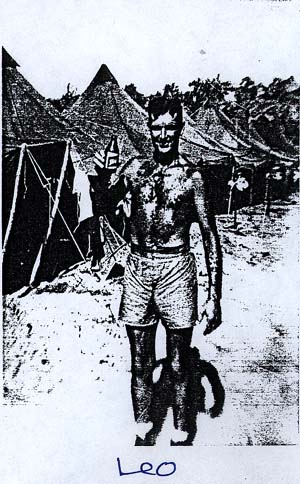
Leo Henehan
Feb. 28. 1944
Dear Kate and George
Your letter made me feel alive once more—an inspiration, so to speak, for one existing in a place so remote from even a resemblance of civilization. I bow before thee on bended knee, offer my many thanks. You mention the presence of my good spirits. Might I add, in good spirit or in bad spirit, we live “only in spirit” over here. Hopes for the future, of course.
How come this fellow you mentioned could tell you in such great lengths about this place? We are strictly prohibited from it. I wouldn’t want you to know anyway. Of course, its not the paradise that so many people think it is. I, for one, think it affords one, especially a “youth” like myself, great opportunities. It is virtually a vast domaine of unexplored territory. Perhaps his tale covered the New Gujinea front. I have attended that place but am no longer there. I have advanced to another island which, at present, is of an undisclosable nature. Exciting as it is, we are all enjoying it very much. Again, I repeat, plenty of experience available to the up and coming young man with hopes for the future.
George, congratulations on your 2B classification. I wish to hell I was one of those damn 4Fs.
Take it oozie, kids and don’t forget “If you don’t write you are wrong.” Kate Smith and I agree.
Much Love, Leo
— Leo Henehan, one of 7 brothers serving in WWII. Only one didn’t make it back
June 10, 1944 US Navy, Sampson, NY
Hi folks,
How is everybody in civilian life? Things are going along pretty good down here. The final week was the worst. It is damn hard to change overnight to be a sailor but I guess I made it. I wouldn’t advise anyone to get in—stay out as long as you can. It isn’t what I thought it was. I am counting the days already. I want to see my family. Tip a beer over for me now and then. I don’t get any here. We don’t get much time to ourselves.
— Cliff ??, married to Helen Henehan who had 7 bros. In WWII, writing to in-laws
Sunday morning, April 16, 1944 Fort Ord, California
Dear George and Family,
From my address you can probably figure out what I am doing here, just in case you don’t I am in an amphibious tractor battalion. What they plan on doing with me is beyond me. I have had six hours of driving a tank so I guess I am supposed to be good, yeh! I don’t even drive a car—that is, I never have. And I certainly am not a sailor. For one thing, these tractors have a different motor in them than the M4 tank did. (after the birth of a son Al had not seen)
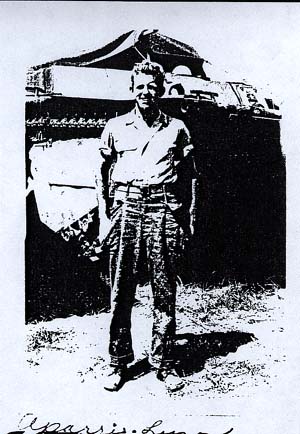
One of the Hanehans
Sat. April 29, 1944
Dear George, Kate and girls,
I’m just fine but would damn sight rather be home where I belong. Have you gotten to see the baby yet? Boy, wouldn’t I like to be able to see him and Liz. They expect me to be able to keep my mind on school but I just cant. I’m damn sick of school anyway. So far, I’m getting by but that is all. I understand Cliff is going in the Navy. I’m sorry to hear that. If he doesn’t do any more than I have he wont do anything. I’m the school kid and when not in school the K.P, kid. That makes a fellow feel as though he was doing an awful lot to get his war over. You can see what I mean. How do you stand in the draft, George? I hope you don’t have to come in. you can do more good where you are.
New Guinea, 30 July, 1944
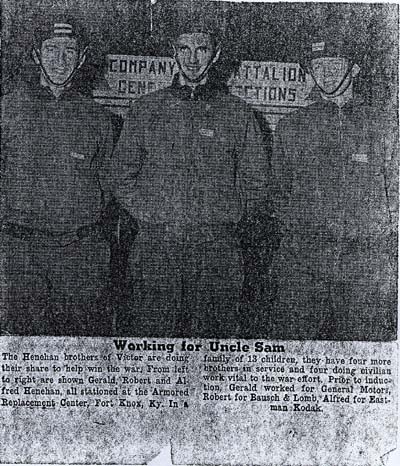
The Henehan Brothers
Kate, George, and Family
I have been informed by my mother that you people have a very enjoyable week at the lake, some class I call it. But don’t start bragging to me about hose luxuries or I will really pour my good fortune on. In the first place, a while back I took a short ocean cruise which ended here in scenic New Guinea. After my arrival I got for myself a home on a long white sandy beach with ocean at my own disposal.
Every time I feel the urge for a dip in some cool refreshing salt water I merely don my bath attire and proceed on my merry way. I had better stop now or you will all pull claims and venture into this very luring tropical paradise. Now you tell me about your wonderful vacation at the most beautiful of the Great Lakes.
If you are interested in the voyage across the blue Pacific, it’s a great experience. To get the full enjoyment of it you will have to cross it yourself. As for myself, I enjoyed every minute. Perhaps because the ocean remained calm almost the entire time or else I was used to the water from my stay at Monterey. One thing: the ship’s crew made a big fuss about crossing the equator. They had the usual ceremony of initiating all the scallywags. I am now one of the tried and true shellbacks.
Naturally, I cant tell you where I am, what’s here or what, if any, our plans are. In a nut shell, anything military. That only leaves the ocean and the jungles and perhaps how little work I have done. I have finally got my mansion on the beach set up which I share with five other persons because of the war.
— Al Henehan, one of 7 brothers serving in WWII. Only one didn’t make it back
February 1, 1945
Some of the boys here are shooting deer. They are plentiful but quite small. I havent any desire to hunt animals. I shall be glad when I never see or hear any kind of gun.
I must close for now. My candle is burning low and I’m nearly out of space anyway. When the groundhog comes out tomorrow, I hope he doesn’t see his shadow in America or France either.
20 April 1945
Dear Kathy,
Daddy is finally getting around to answering your sweet little letter. The one you wrote so long ago. It seems such a long time ago and yet its even longer since I last saw my little girl. Mommy sends me your pictures all the time and I can see that you are getting to be a big girl. Pretty too. Daddy loves you so very much. All I ever think about is wanting to see you and wondering what you will say and do when you see me.
How did you like your first train ride to Buffalo? I hope you were a good girl and didn’t give mother any trouble. I’ll be Grandma was glad to see you and made a big fuss over you. Your two aunts too. Wait until I come home. We are going for lots of train rides, auto rides too. Just mommy, you and I. We will go all over and make up for all the fun we have missed since I’ve been away. Mommy tells me that you are a spoiled baby but I don’t believe her. (Don’t tell her I said that or she will be mad at me). If I were home I would rock you to sleep every nite and I wouldn’t let her stop me. It would be swell to hear you say “Daddy take your baby”.
Don’t forget to be a good little girl always. I miss you so very much and cant wait until I can see you.
All my love and kisses,
Daddy
— Kathleen Knab’s dad who wrote to a little girl he hadn’t seen in 3 years
December 12, 1945
Yokosuka, Japan
Dearest E,
I made it, lovely. I leave the Bennet sometime tomorrow for the Sanborn. Don’t know when she shoves off for home but know it will be in a few days.
I’m on my way home, lovely and I’m so damn happy I don’t know what to do.
Love as always
Your Joe
June 29, 1945
Hello dad,
This is your daughter, Margie writing to you. I hope this letter finds you in all the best of health. Mother and I are the same.
Daddy, I have not played out any today. It was a bad day and mother wont let me go out.
Dad, I have never seen you but my mother shows me your pictures and I know I am going to like you for mother sees I see your picture every morning when I get out of my bed. I wish you could be here with mother and I. We could go out have some good times. I hope its not long, dad. I am sending you a picture of me and you can see I don’t have on anything but you can show it to the boys in your camp. I know you will anyway.
Your girl, Margie
PS dad don’t you and mother let any of the boys see this picture when I get up around 16.
January 1, 1945
Dear Family,
Well, I didn’t go anywhere as I thought I would however you were almost minus one son as of yesterday. We escorted the bombers in an area I have never been to before. We encountered enemy fighters in the target area. We were flying about 29000 feet and those bastards were about 5000 feet above us. There were only 20 of us against about 100 of them. We dove into them and my flight leader bounced one. I followed him through but lost control of my ship when I hit compressibility. I lost 20,000 feet before I finally pulled out in an 8 Q pull out. The plane was going down at upwards of 650 mph and I sure thought I had had it. That wasn’t anything though with what happened next. I was going so fast that I couldn’t get control of the plane. When I finally did, there was an FW 190 on my tail shooting the hell out of me. I lost half my rudder and the wing was so full of holes you could have used it for a sieve. I pulled around sharply and got a shot at him. He went down in flames and I pulled up and rejoined the squadron. Even as I write I am still sweating. I flew the whole way back alone as the squadron got broken up again when we were bounced for the third time. I flew at 33,000 feet in a plane which I thought was going to fall apart at any minute. I have never been so scared in my life. I didn’t really feel it until I got back and took a good look at the damage. I found one hole in the canopy right over my head and I almost collapsed. Last night I was so shot the Doc gave me a couple of sleeping pills and sent me to bed at 7:00. Today I was up early and in another big fight with a new ship. Well I now have one Kraut to my credit anyway.
— Lt. Donald Fisher to his family
Korean War
Korean War
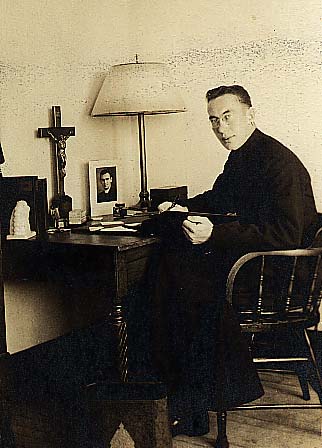
John Kennedy went to seminary school and left before he became a deacon. He met and fell in love with a woman named Lorraine soon after school. He was then drafted and eventually became a Chaplain’s Assistant. He later married Lorraine. Photos below.
North Camp Polk, Louisiana Sunday, Sept. 22, 1946
Dear Mother & Esther,
Well here I am away down in the Deep South. And when I say Deep South I mean just that. Right now it’s so warm that I have to wipe my glasses every two minutes and in the next instant they are blurred with sweat again.
The train ride down here was quite an ordeal. Fifty-six hours on the same troop train is no soldier’s idea of a picnic. I hope you got my telegram. For awhile I debated about sending it for fear it might scare you, but in the end I figured it would be better that you know at least that I was no longer at Dix.
John Kennedy
This is a Medical Corp Camp which means your son and brother has been assigned to the Army Medics. My qualifications for this assignment are about the same as the rest of the guys in this company. The main one being that I am a draftee and the Army is not interested in anything but getting the most out of use in the eighteen months as possible. If anyone tells you this on of the worst camps in the country tell him I agree with him. What was it they use to say about Victor, Ma? Well the same goes for the Polk and double in spades. Perhaps you are gathering from this that your son is a slightly dissatisfied member of these Armed Forces. You’re right! I don’t think I have been through a more discomforting period in all my twenty seven years as these last two weeks. The first time I hear anyone say that time in the Army adds up to valuable experience I’ll cut his or her legs off.
The hardest part beyond the physical discomfort is the mental anxiety of not knowing how things are with the people back home. If you could only know from hour to hour that those you love are all right then it would not be so bad. But being over twelve hundred miles from home and no real knowledge beyond your own barracks builds up to an awful ache inside of you. I miss you both so very much and there is someone else I miss terribly too but I guess maybe you would rather I didn’t mention that. But she is so important to me that I wish she would be a little important to you too. This is the first time I have ever put that thought into words but I can’t help it this time.
As much as we know now we will have to be here at least eight weeks. That period comprises what the Army calls Basic training. After that no one knows. some say that if you go overseas you get a twenty one day furlough at the end of Basic. If not, you go from here to school and after six months you can put in for a furlough. Can you see why I like the Army? However that is just Barracks gossip and no one is really sure. Since I am almost positive they won’t ship me overseas, maybe I can get home some time around Christmas. I hope and pray so anyway, tomorrow night being Monday and Queenie’s usual night in, I’m planning to call home. Please God everything is all right there! That’s the thought that is constantly revolving around in this poor brain of mine.
If I could walk through that hallway to the kitchen and drink a glass of water before the clock it would help more than words can tell. Sorry that part slipped. The last thing in the world I want to do is to make you feel any worse than you do. Actually we have a much better deal than the war veterans ever had. When they were ushered into this deal they had no idea of when they would get out and what’s more there was an enemy shooting real bullets at them in a country even further removed than Louisiana. Considered in that light this is soft duty. It’s only that your memory plays you such hard tricks by flashing back things and people that mean more to you than you could ever hope to tell.
Very soon now I will be sending you the allotment form which I hope will mean government checks of fifty dollars addressed to 52 Atkinson St. The only reason I have not sent it yet is because I want to check a little further to make it as sound-proof as possible. Back at Dix when they questioned me about it I misled them to some extent in order to get the application. As far as they know my weekly contribution is to the family finances was twenty dollars instead of the actual fifteen. You Queenie, I listed as contributing twelve dollars. According to those figures the allotment will go through. The only hitch is they may check the income tax reports to see which one of use claims dependency. That would be you, Queenie, but I figure we could say that you are the head of the family and we were in agreement to that because I am younger and was making more money so that deductions would not hurt me as much as you. I don’t want you to ring Joe in on this, Ma, for his advice. Either, you talk to someone and find out. I’ll be writing again tomorrow. So Love to your both.
Your loving son and brother, Jack.
December 31, 1946, New Year’s Eve
P’ohang, Korea
Dearest Mother,
Sorry about not having written these last few days. Things piled up on me to the extent that I just couldn’t squeeze in any letter writing.
If you have noticed the heading you must have realized that I’m not in my usual billet. My company is at Taegu and this is P’ohang. The reason for this temporary change of quarters is because I am filling in as Chaplain’s assistant. Father Hartlage and myself rode the 62 miles over the mountains this afternoon in order that he can celebrate Mass here tomorrow morning. It’s a long, cold, ride in an open jeep and I would much rather have stayed back in mine own quarters but naturally I didn’t tell him that. This is the second time I have been up here this week. Last Saturday it was the same story. The guy who is the real Chaplain’s Aide is “goofing off”. He does have a cold but what he really doesn’t lie is that ride over the mountains. Just one more example of the superiority of secular training over that of the religious orders. This fellow studied at Maryknoll and plans to go back when he gets out of the Army but they’ll have to inject some stamina in him if he is ever to do the Order any good. The Padre told me this afternoon that if he were going to be here he would see to it that the job would be mine. That’s all very well and good but in that respect I’m just as glad he is gong state-side. This packing up and starting out cross-country for one night stands is hard on the health. Until I get over that last stretch of traveling I’d as lief (readily) stay in one place. Not only do I lose out on my day’s off but the chaw in this infantry battalion at P’ohang is poorer than poor.
That’s not the proper attitude I know, Mother Mine, but if you don’t look out for yourself on this side of the world – no one else will.
I have a slight cold but nothing especially terrible. At this moment, I am practically sitting on top of a pot-bellied stove so I’m warm. Pretty soon I intend to hit that sack for some much needed sleep.
Back home a lot of people are probably getting ready to knock themselves out. I hope they have fun but I doubt it. Me, I’d trade a couple years of my life to sit down on the edge of your bed and just talk to you for awhile. You get awful sick of strangers and “gooks” Ma.
Here’s a dry toast to the New Year anyways. The Old Year gave me nother but some bitter lessons. I think I’ve learned them well for I have come by them the hard way.
Your mustn’t take my moaning too much to heart. There’s altogether too much time to think and feel sorry for yourself over here.
Good night Irish. I miss you very, very much.
Your ever-loving grateful son,
Jack
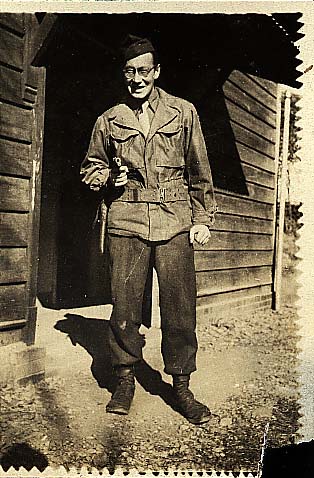
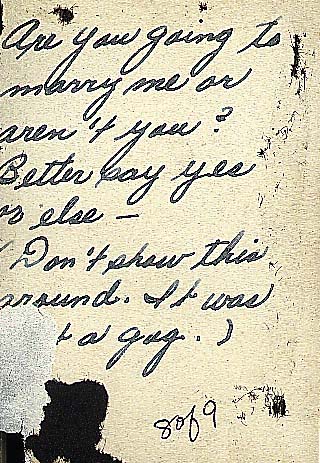
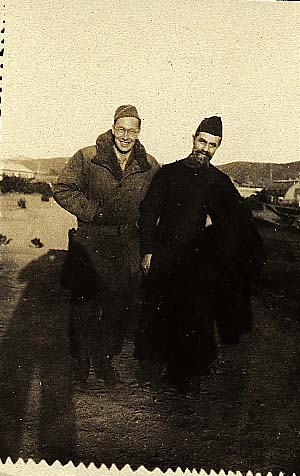
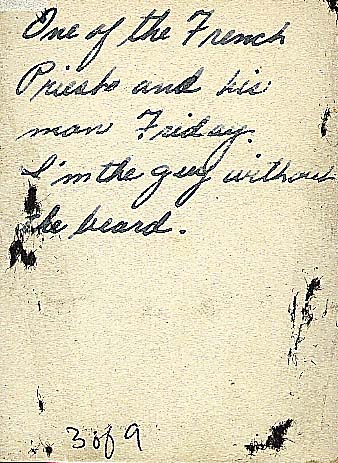
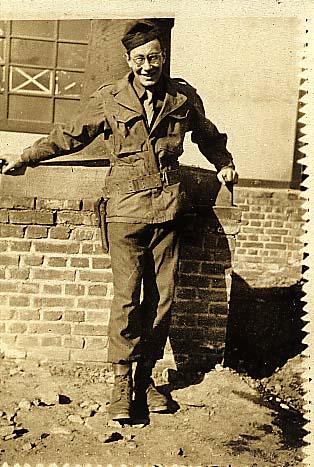
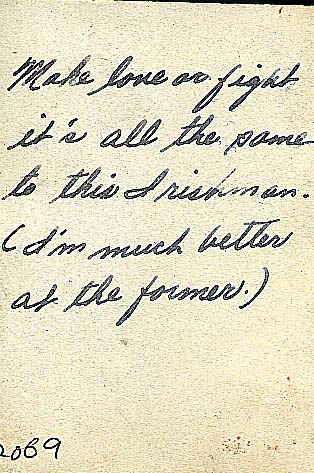
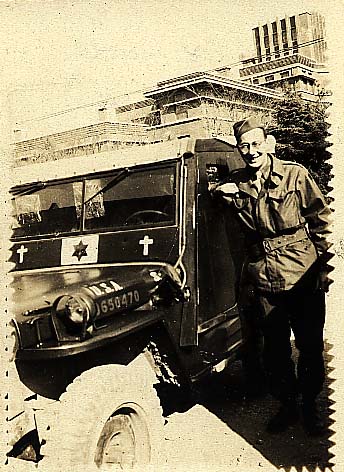
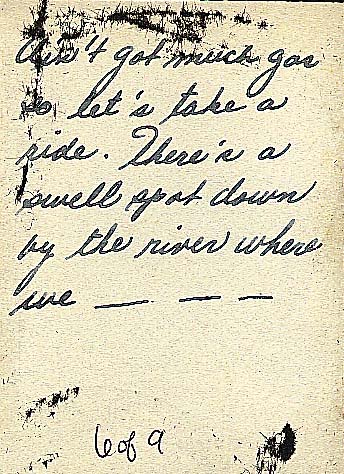
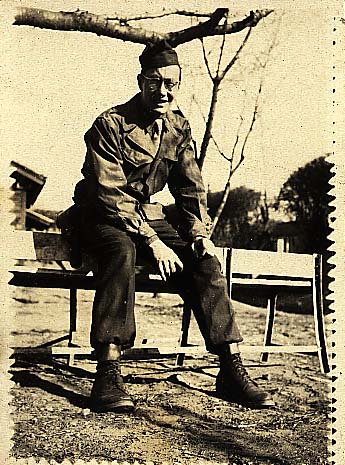
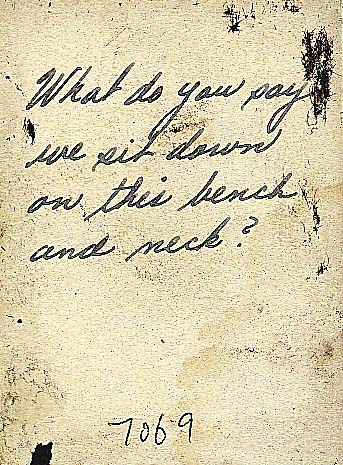
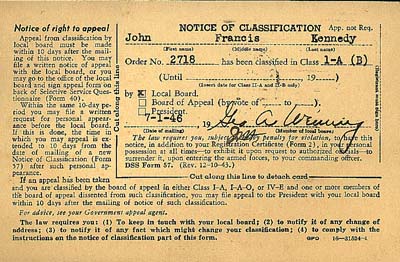
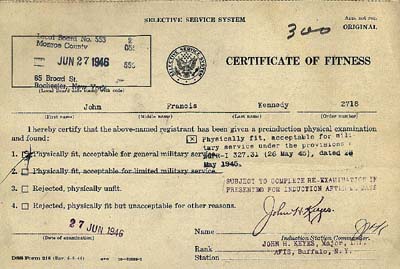
Vietnam War
11 August, 1969
Hi Carl,
Carl, I learned a lot of things since I came over here, one is HOME is a beautiful place and most of all the parents. I called home a couple of times and I talked to my mom and father and their voices sounded nice. It made us all feel a lot better inside to hear our voices.
— Sp.4 Carl Brauer, Co. C 86th Engineering Battalion (writing to Carl Bell)
2/4/69
Dear Betty,
I want to thank you and the cubs for making me an honorary Cub Scout. Please tell my fellow Cub Scouts I will wear the Bob Cat pin with pride and as soon as I do a good deed I will wear it right side up.
God Bless,
Joey
P.S. Being a nut about chocolate cake is bad but when it has chocolate frosting, LOOK OUT!
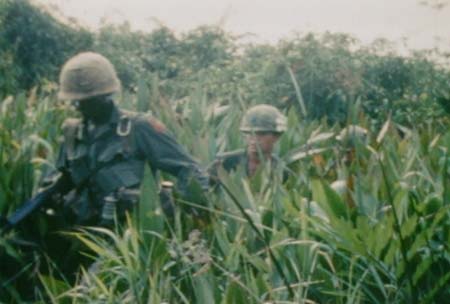
2/17/69
Dear Betty,
In your letter, Betty, you mentioned to tell you what I really want for Easter. I think I can speak for everyone here. Next month the rainy season starts. That means we will all need something to put our cameras in, paper ID, pictures, etc. I think they call them “baggies” plastic or cellophane bags that hold things inside and is watertight. Actually, this is all anyone needs. One box can supply a platoon—two bags per man. Its hard to believe but when you come in from the field and go into your pocket for your girl’s picture (those who have one) its pretty demoralizing to see your girl all wet and cracked and can hardly make out what she looks like.
4/16/69
Dear Betty,
You certainly can read between the lines. One more incident and I would have probably cracked and come close to breaking. There are so many things, Betty. The company is brand new, they haven’t learned to stick together, they don’t seem to care about anyone. The old company and especially the Third Herd lived as a close company, fought the same and just was completely different—the last two weeks I realized that our family is no longer a family, just a bunch of people who think this war is just a game.
4/28/69
Everyone knows unity is strength but there are too many kids in Vietnam. They’re too lazy and don’t want to work for that unity. Its beyond my help and sorry to say but also beyond John Sperry’s help. What we need is a miracle and a few dozen courts martial. I’ll have to drop the subject before I get nasty.
6/16/69
Just got word that we are supposed to leave or at least be on the plane back to the states July 5th. I will let you know for sure when I find out for sure.
I will have to go back into the field. I’m so shaking that I feel like I’m going to crack. Our last operation is supposed to be the 26th of this month. I’ll have to get used to it all over again. I cant write that, I’m so tense. I can hardly hold the pen. I hope God’s still with me. I cant make it alone.
6/25/69
Might as well get down to the nitty gritty. The dreams I have are not dreams, they are nightmares. I am not concerned or embarrassed about them. Its just that if I’m having these dreams and someone tries to wake me, they’ll have a fat lip or broken jaw. If no one wakes me, I’ll just get up all of a sudden with an urge to strike, shaking like a leaf and in a cold sweat. They have eased up and come less frequent. Think I’m getting nuts. Ha ha. Well, another little secret no one knows but you.
(unsure of date and the punctuation and spacing below is largely my own)
Please God…
Oh God, why is it that when we want to be good and share love, we are forced to be hard and cold to survive? There comes a time when you want to cry because you realize what you have and what you left and what is there.
But there is always something, isn’t there God? To spoil it all. To take away those tears of joy that you were never able to shed and instead there are tears of sorrow on our loved ones’ part. We could never shed tears of sorrow. We have forgotten how. Instead, our minds become warped and our hearts heavy and our souls full of hate.
One short year in 21 years we have changed.
Please, God, stay with me, help me never to forget that you are here with me—that there is always a chance—always hope and somehow, Dear Lord, to overcome the things that oppress us and the changes that have taken place. Never let me forget, God, and never let me go through this again.
I want my life. I want to live no matter what I must face. Where there is life, God, there is hope and a chance for things to get better. If things are that bad where you do not want to live—do not have life, things cant get worse. They could only get better with time. Give me the time and my life, God. Give me the chance and stay with me. That’s all I ask. It’s a big request. But when you realize what the meaning of this request is, it can only mean it is sacred and everyone deserves that chance. Please bring me home alive.
I am sick at what I see and I am scared.
Give me the courage and confidence needed to make it, God. You understand—I don’t have to go on and on. You know what I am on the inside,
And God, if I have to die at such a young age, let me die in my country. Please bring me home alive and watch over me.
Thank you, God, for everything you have done and for making my chances look good. And I know if I keep my escaping faith, I will make it.
Please, God, please,
Sgt. Joe Cardone
Mekong Delta, South Vietnam 1968-69
— Pfc. Joe Cardone from Bronx, writing to Betty Bell, 20 years old, 5 feet 7”, 130 lbs, curly hair, worked NYSE as a senior gateman before army, Co. B 3/60 9th Infantry Divi.
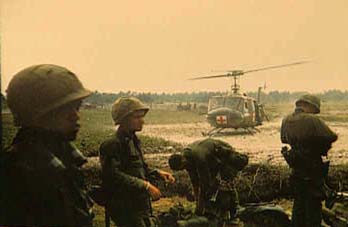
January 9, 1969
Dear Betty,
My wife doesn’t know anything about what I am trying to do for the boys here. I don’t exactly know why I do not tell her but I just don’t. I do not tell her very much that happens over here. When I go home, I shall forget everything but my boys.
— Sgt. John Sperry, writing to Betty Bell
25 April 1969
Why have I been in Vietnam so long? That’s a hard question to answer. Many reasons wrapped up in a lot of little ones. Maybe your reason isn’t so selfish. I’m a parent myself. My little girl will be one year in May the 1st. She lives with my ex-wife and her parents in North Carolina. That’s one of my reasons for extending again.
I hope by the time your son will be old enough to be qualified for the armed forces, this will all be a thing of the past. But then there will always be some other unrest over in Korea or somewhere. There always has and most likely will.
That’s the hardest thing to understand for a 17, 18, 19 year old kid over here believe me. I know Ray (Reardon from Chicago) is a good example. He has no more business being in the army than the man in the moon shall we say.
He’s still just a baby in more ways than one. Ray is sorta my favorite. He was just a RTO with one of the line companies when I first seen him. I had just got out of the hospital and they gave this LVO team to me until my leg healed. He had been sent back to be a skin infection taken care of. Ray’s just like he sounds, a frail, shy kid. He’s a good RTO—a little high strung and emotional but not the type to be out on the line getting shot at. I’ve put a lot of time, work and patience in that boy. Soon he’ll be out and it will be over. I’ve had to work my tail off to get him almost everything. I have but he’s well worth it. He’s hard to handle at times and for a quick tempered person like myself that’s not easy. But then again what is in this world?
Sorry I got carried away there for a while. You’ve got quite a family—7 house apes as my mother would say. It will be quite a while before I take that step again. 2 years was too short of a marriage. Maybe its just my generation but this war is a little different when it comes to wives and sweethearts etc. war and love just don’t mix like they used to.
14 October 1969
This war’s sorta hard to take for a lot of kids it’s a real mixed up one. But the majority of the kids who are involved and have seen action know what’s going on. Like you said, people are getting harder and harder to give a hoot. People don’t really take the time to understand what is actually going on over here. But believe me if they could spend one day where its rough over here they would never forget it. Especially when they see 18 year old kids do that job that everyone else is so damned scared to do.
That’s why when you have spent your time over here not in the rear but up on the line you, if you’re still alive, appreciate so much more when you know you not only spent your time but you did your job. Then when someone let’s you know they care that you’re not risking your life just cause you have nothing to do better with it.
But you’re defending the way of life that was given to you! Now someone asks for you to make a little payment on it. For some, it’s the complete payment they can give. 40,000 have paid that price. They are even paying it for that jerk back home in the states so he can carry his sign and burn his draft card.
— Sgt. Dusty Behrman, on 3rd tour, now with LVO or LNO team HDQ Co. 1st of the 503rd Inf.
March 18, 1972
Mrs. Bell,
I received your card today. You seem to have a special talent for dropping in at the right time. I had all but given up all hopes of getting any mail when just in time your card was right there to save the day.
I don’t think I told you in my last letter that I found out (the Philippine girl) that I was going to marry has gotten married and is now in the States. And that she left our baby in the Philippines with her mother. If you knew how much I loved that woman then and only then would you know how much it hurt me to fine (sic) out these things.
There has been a lot of change in me since I returned from my leave. I have taken a new look at the world and I don’t like what I see. And I fine myself trying to get as far away from it as I can. There is only one good thing. I have not started using drugs or alcohol as a means of my escape, thank god.
But I do fine myself not really caring about anything any more. When I got there (the P.I.) and found out all these things I found myself doing things I never would have done before. I spented $800 and I don’t know where or on what.
The thing is I realize what my problem is but I don’t know what or how to do something about it. I guess you don’t want to hear any more about my problems. So here is good luck to you and yours. Take care. Yours, CW. PS Write soon. I would like to hear any advice you have. I am a good listener.
— Charles W. Bell (writing to the Bell family in Greece)The previous letters are from a collection of letters sent to Bob and Betty Bell who lived at 174 California Drive, Greece. Donated 580 letters from servicemen all over Vietnam.
Sat. Jan. 31, 1970
Love Grandma very much,
………I suppose I should get a little transistor radio. I always seem to miss the early morning newscast which the other officers report at the breakfast table. Big item of last night: somebody planted a bomb in the ladies john in a movie theater next to the REX Hotel BOQ…….which did some damage to that building…..and get this: two MEN apparently were blown out of that john! Figure that out! I wonder how it was reported in the stateside papers?!
Monday afternoon 1500 2 Feb. 1970
An American doctor with USAID invited us for lunch today aboard a floating Chinese restaurant way downtown on the river. Has been bombed about 3 times already, they say. Recall Cecil saying that the usual VC practice is to set off ONE detonation—when everyone scurries ashore to see what’s happening, they set off the “real” one for full effect. But anyways, the weather was really nice, slight breeze on the river and food very good.
— from 300 letters donated to U of R by alum Frederick W. Meyer, Jr., Capt. In USN, lived in 1980 at 5217 Shore Drive, Virginia Beach, VA. 804-464-9406. Was Deputy Command Surgeon in 1970 on staff of Gen. Abrams. Referred to wife as Grandma
Monday, July 12, 1971
Well, the VC have been moving a little closer these past few days. They blew up a bridge about a mile down the road and I tell you they did a mighty fine job on it too. There been some heavy fighting up the river a little ways too with casualties on both sides.
— radioman Joe Almeter
March 5, 1971
I’ve been on land and in a few firefights with Charlie and I’ve seen his handywork. It isn’t pretty. I don’t really agree with war but I’m glad its there than home. Knowing you people care helps 1000%.
June 10, 1971
My favorite division officer wanted to know today why I was tired when I got up at 0530 for quarters.
I was told he was to be part of our landing force party. I’m already a member. If I have my way this 20 year old hoot of an ensign wont make it back off our first patrol. I’m not going to do it because I know I could never shoot anyone in the back but he made me so mad I felt like throwing him overboard.
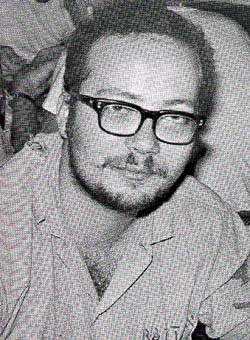
Ron Bottoni
October 1, 1971
Hi, Well, here we are in Sunny Da Nang. Not really, we left yesterday. Today we are 20 miles SE of DMZ and 2-4 miles out. Firing at Charlie. One round yesterday and one today cost you lovely people $310,000. Isn’t that nice. I earned me $220 more next pay day.
We got a few sayings we picked up over here such as
Withdrawal was something Nixon’s father should have done 58 years ago
Or
Fighting for Freedom in Vietnam is like having Intercourse for Virginity
We are a tired and bitter crew. I’d hate to be the guys ashore. I don’t think I could take it. I got 6 hours sleep in two days. We stand 6 and 6 and have to work the 6 we’re off. Great isn’t it? 6 and carry on.
Sit down. I got married. Now you’ve flipped, right? Well, not really married. Just common law. It cost 50p (less $10) and it saves time and money of buying her out every night. She’s kinda cute. She’s part Indian, American style. You think you’re bad (Bell’s had 8 kids). One guy got this gal who had 14 yes 14 kids. He took her out. So there’s always hope.
Well, I’m on watch so I guess I’d better watch. Something anyway.
Always, Ron
— Ron Bottoni (USN aboard the USS Goldsborough)
March 6, 1971
Dear “Mom” and Crew
Last night the artillery caught approximately 90-100 VC guerillas in an open rice paddy and dropped 12-149# projectiles in their lap. We don’t know the results yet and when we do, I’ll let you know!
We’re going on a night ambush and boy do those things get hairy at times! You never know if you’ll get contact and then if you do you don’t know how large an enemy force you’ve got till you step on your head.
March 4, 1971
Dear “Mom” and Crew,
Yesterday, we medivac’d a pair of young girls for multiple fragmentation wounds of the body. One of them was hit in the legs, abdomen, arms and feet! She was 19. The other girl was about 12 years old and had frag wounds in the head, neck, chest, and abdomen. We got them out of here alive but found out today the younger one died on the operating table. All of us on the team (MAT 56) prayed for her but I guess it was her time. I feel bad because I couldn’t do anything to help her.
The wounds were from a booby trap.
We found a boobytrap constructed from a mortar tonight. The Lt. And I dismantled the trap and found a grenade attached so we blew it up in place! Another inch of movement and I would have gone home in a box or on a stretcher in very bad shape I think.
You know sometimes its rather ironic that I can say things to you that I couldn’t ever say to my friends and sometimes my wife……….I’ve always kept things bottled up inside and you are the first person I don’t know, never met, know very little about that I can write freely and feel well relieved.
I guess I just feel kinda homesick and rather alone at times. I already wrote my wife and told her all was well and I’m sorry if I’m crying on your shoulder but I just feel so frustrated about the whole mess at times. Just this war seems so futile at times, when children are the hapless, hopeless victims of war.
Good night, sweet dreams and may God bless you all.
Love always,
John
June 20, 1971
Dear Mom,
Well, actually there has been some problems over here. I made a mistake or two and got reduced to the rank of Sergeant E5, fined $150 and am about to be released from the service. The discharge was asked for by a psychologist at the hospital after I had sort of a nervous breakdown…….in 21-60 days I will be given a general discharge under honorable conditions and allowed to live with less tension.
At present, I am taking 300 mgs of tranquilizer a day to keep from going bananas. At this time I am looking forward to my release and I don’t know what kind of job I will look for as yet.
Maybe, mom, its for the better as the Army is getting to be a complete farce at this time. I guess after my stint on a nut ward for a week and talking out my frustrations with a psychiatrist and a psychologist, a whole lot of tests, it appears I need help. I sort of through (sic) in the towel and I quit. All I want now is OUT!!!!
June 2, 1971
I hate this way of expressing myself but I am beginning to hate a militant way of life! All I want to do is settle down to a halfway decent job, raise my family and be a decent proud American. If I ever put on a uniform again it will be in a total war. Love always, John
(got f-d up on Vietnamese “White Lightning”, twice impersonated an officer, incidents he didn’t remember, was in a “fugue like” state for a week on a “nut ward”, was told he had a schizoid personality with a paranoid manifestation, not adaptable to military servitude)
— John Capano (writing to the Bell family. Was on Mobile Advisory Team in Mekong Delta, on 4th tour of duty. Born 11/24/45, stood 6’5’, raised in Illinois, entered army 21st of January 1963 after quitting high school, served in Korea 1963-64, Thailand 64-65, married to Linda, son John Jr., hobbies: art and commercial art and industrial engineering, called Galveston, Texas home then)
Friday afternoon 1610 6 March, 1970
We went over to their main military hospital opposite Cue Quan y—“Cong Hoa” hospital. Again, may I say “don’t ever let anyone tell you that the Vietnamese haven’t suffered in defense of their country. Several times, tears came to my eyes as I went through the paraplegic ward, the amputee ward, etc. I stopped by many beds to chat with the aid of some interpreter—what’s the problem? How long you been here? Where you from? Etc. By their standards, it is about the best they could expect to do—and not bad by our standards either—quiet, clean, ventilate, some TV sets here and there, etc. Used to be French, of course. They all seemed to respond to my interest, no matter how bad off—a cheerful word, a good luck sign (thumbs up), a salute, sign language. One of these days, I’ll drag a newsman through and see what they say then! If I can get them out of the bars in their hotels (my suspicion).
29 November 1970
I’m literally risking my neck out here in Vietnam because I believe in Freedom—and they’re too damn many people back home NOT worth risking my neck for!
— Capt. Frederick Meyer
FEATURES
Hear The Letters
Civil War December 1862 — Daniel Pulis
Civil War October 15, 1864 — Charles Curtis Brown
WWI August 8th, 1918 — Esther Steele
WWI November 13, 1918 — Marie O'Keefe
WWII What were WASPs — Dawn Seymour
WWII March 6, 1944 — WASP Flight– Dawn Seymour
WWII February 6, 1945 — Armand LaMay
WWII May 3, 1945 — Russell Smith
Vietnam 22 February, 1967 — Brother Wease
Vietnam 6/25/69 — Joe Cardone
Letters to My Family
Letter to My Family: World War II
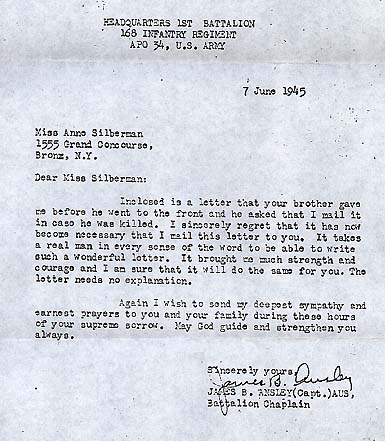
Dear Miss Silberman:
Enclosed is a letter that your brother gave me before he went to the front and he asked that I mail it in case he was killed. I sincerely regret that it has now become necessary that I mail this letter to you. It takes a real man in every sense of the word to be able to write such a wonderful letter. It brought me much strength and courage and I am sure that it will do the same for you. The letter needs no explanation.
Again I wish to send my deepest sympathy and earnest prayers to you and your family during these hours of your supreme sorrow. May God guide and strengthen you always.
Sincerely yours,
James B. Ansely (Capt.) AUS,
Battalion Chaplain
From William Silberman, PFC.
Somewhere in Italy
January 12, 1944
Dear Mom, Pa, & Sisters,
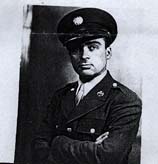
I’m sure I could express my thoughts better by writing a Jewish letter but time is so short and right now so very precious that speed is very essential. Now I’m going to write a lot of silly things so take it at its face value. If I come out of this alive you’d never receive it but if instructions are carried out accordingly it will be all over with me. I’m only taking this step so that you will all know that I went into this thing willingly and not reluctantly. I was always curious and in this case you would say curiosity was a factor in contributing to my death. Don’t infer from I just wrote that I was slightly crazy because that would be very far from the truth. I was inducted because there was a war to fight and certainly that wasn’t any of my doing. I believed that what I received was written in the cards and nothing would change it. You can also realize that as an American I had something to fight for and because I am Jewish I had something more to fight for. I wasn’t going to let somebody else do my fighting for me. Anyway I figured that whatever fate had in store for me I wasn’t in any position to change her plans.
I write this so you would know in what frame of mind I was in a day before my buddies and myself were scheduled to go to the front. I’m sitting at a table in a little Italian farmhouse, which is not far from the front. I’m not the only one writing and there are quite a few waiting to get a seat. I wonder if there is anyone else who has the same plans that I have, namely writing in the same view as myself. My morale is high and I feel that luck is with me but anything can happen.
This fighting business is only a lot of common sense and a lot of luck but I suppose luck was against me. I’m in a swell outfit and since being here have made a number of friends that I know I can count on and naturally vice-versa. Quite a few things might happen, Anne, so if its God’s will I might still be alive but the chances are very slim if you are notified by the government. I want you to feel proud of the fact that I made the supreme sacrifice as they say and you can hold your head high knowing that I never did anything that would make you ashamed of me. I want life to go on as usual as far as the family is concerned and that Chuck comes home and you live a happy and normal life. I haven’t any regrets that I can think of and know what life is. I know that it’s going to be hard on Mom and Pa but I wish, I mean, I demand that they carry on with their life and not let my death in any way deter them from enjoying a peaceful life. It’s hard to explain my feelings because I’m in the best of health right now and only pray to God to be able to write happier letters than this one.
I spent the day by being present at a gathering of our Battalion today and was thrilled by having General Mark Clark present the Congressional Medal of Honor to a lieutenant for doing combat that really deserves far better than that. Four other noncommissioned officers were also given the D.S.C. General Truscott was there too and so I feel that very seldom is such a ceremony possible to be seen by a soldier who just got under the wire in being assigned to an outfit. It really gave me a thrill. You’ll probably see them in the News Reels.
Tonight I attended the Jewish Services conducted by a Protestant Chaplain. I was accompanied by a staff Sergeant and it relieved me a great deal. There were only twelve of us besides the Chaplain and he also took part in the Services. He’s a swell guy.
If you think it’s easy to end this letter you’re mistaken but end it I must so again I’m begging you. Don’t take it too hard and hold your head high. I’m going to do all in my power to do my job and to keep this letter from being delivered but as you see you wouldn’t know anything about it if the unforeseen didn’t happen.
Love,
Willie
Letter Returned
From the Producer, Wyatt Doremus: Russell Smith’s letters
When you begin your research you never know where it will lead….
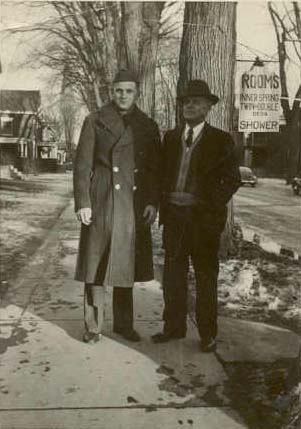
Someone (probably Russell’s sister but we’re not 100% sure) in the Smith family was a resident of the state hospital at Willard and had in their possession letters sent by Russell Smith to his dad and soon to be stepmom in Geneva. When the hospital was closed down, an administrator there wanted the letters to have a good home and gave them to the Rochester City Historian, Ruth Rosenberg Naparsteck. When I asked Ruth what collections of war letters might be available in the files over at Local History, she mentioned the Smith letters as a possibility.
The more I read Russell’s letters, the more I grew to like the man who wrote them. He was alternately serious and wryly funny, sober and clear thinking. Where possible in this project, we wanted someone with an emotional connection to the letters to read them. I wanted to find someone from the Smith family but given that last name, the task looked to be at best difficult.
The people at the Finger Lakes Times and the Daily Messenger were kind enough to put a letter to the editor from me in their newspapers and on-line editions. A day later, we got at least a half dozen calls saying that they probably knew the family, culminating in a call from Russell’s daughter in law who wanted to know why we wanted him. After all, we had just missed him moving from his home near Ovid down to Okechobee for the winter.
Amazed that Russell was still alive (given the circumstances of the donation of the letters, it was natural to assume the worst), we then contacted him directly. He turned out to be just as nice as the young man who wrote the letters all those years ago and agreed instantly to travel 40 minutes to the PBS station nearest to him. The people at WQCS-FM proved to be equally equable, agreeing instantly to not only record Mr. Smith but to handle all the arrangements within the week.
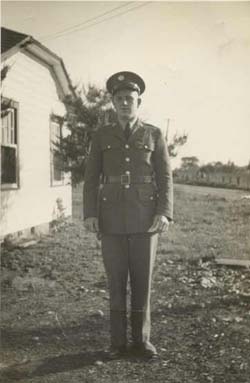
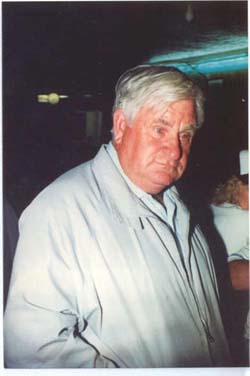
The postscript to the story is that Russell Smith’s letters had never been seen by members of his direct family. His daughter, Sande, told me by email and in person that her dad never really talked about what he had seen and done during the war. The letters gave her and the rest of the family an insight Russell might never have felt comfortable enough to provide. Those letters, thanks to the city historian, are now back in the family’s possession and are being properly preserved.
Artist/Painter
Artist/Painter & Soldier
World War II
Private Leonard Barkin:
In the hospital after being injured.
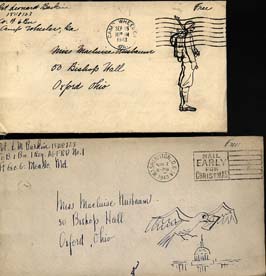
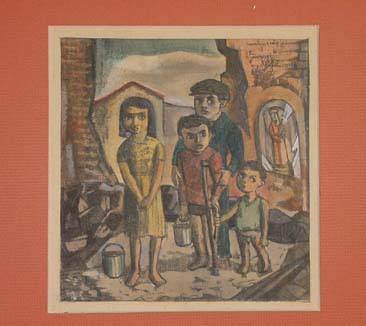
May 17, 1944
My darling,
The Red Cross in this hospital is quite quiet in the morning and I am dodging a nosy medic, so I’ll write you a letter which I have been wanting to since I came.
Mother, I imagine has already told you I was wounded in action, having lost two fingers and a bit of a thumb from my left hand. Outside of that there were no complications.
When the medical clerk came to the side of my stretcher, (I had made my way back to the aid station on foot) he asked me if my wounds were due to enemy action. I told him “either that or someone was throwing rocks at me!”
They then slapped in my good hand a purple heart, a shot of whiskey down my throat, and fifty million kinds of pills.
Now I am in a gigantic general hospital, really gorgeous, with pretty nurses, picture shows, game rooms, etc. Tonight I am going to a real live symphony concert, and I have discovered a well-selected library, I have already played a few games of Ping-Pong, so even though my arm is slung-up, I get around.
I hope this reaches you at Oxford, and that you will have the graduation you want, and when you are up in Maine if you hear a call form one Lenny Barkin don’t be surprised, as the doctor that most likely I’d be sent home.
All my love. Lenny.
May 18, 1944
My darling
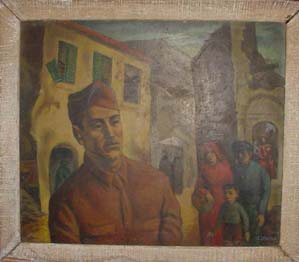
With the sound and the fury left behind, I relax in a very comfortable quietness, totally different than what I have known for some time. What was only a hew short days ago is now only a vague incomprehensible memory, too weird too entirely forget, too confused to entirely remember. Caesar’s Hills and Italy’s hills are the setting in which the greatest drama was played.
Here, in the peace of the hospital the good world smiles again. When we have music, the perfect sound world, and books, the mind world and candy, fruit juice, etc. to make the body feel important again. I play one arm Ping-Pong (which is all I need) and pitch horseshoes and even draw a few pictures. My hand should heal quickly, although the haven’t removed the stitches.
Enclosed you will find a symphony program I attended the other night–good orchestra!
All my love, Lenny.
May 19, 1944
Dearest,
If my notes are short please understand that words cannot say the story. All I can do is tell you a little hello and I know that you can feel with me though the distance the unspoken things.
In the quiet of the hospital the battle is hashed over and the stories retold until the reality of them is almost lost in a babble of superlatives. This does not detract from their essential reality, but only shows the doughboy’s leaning on the more spectacular side of truth.
One doughboy though, came thorough like a thoroughbred, mongrel that he is, and fought and died as “bravely as any Russian”. And those of us who were fortunate as to be only wounded, as those who are still fighting on, are still the same old dogfaces. And thought who are back in the states, and while sitting in the Stock Club, or Joe’s tavern, despair of victory, I tell them that our doughboy’s stand eight foot about any Jerry or satellite thereof and is the only thing that is left with spirit and few pose in this hollow-eyed Europe.
Many boys from outfit are here with me and we never lack company, or to do. There are movies and shows and pretty nurses to flirt with and I am even doing some drawing.
We may see you soon, darling, sooner than we expected.
All my love. Lenny
Women Airforce Service Pilots
Women Airforce Serivce Pilots (WASP)
During World War II, (1942-44) the Women Airforce Service Pilots (WASP), flew sixty million miles from 120 airfields in the USA. Thirty-eight WASP’s died in the line of duty. The WASP was not considered to be part of the military. The women that flew were not eligible for any military benefits after their service. The WASPs were deactivated in December, 1944. *
Meet Dawn Seymour, of Ontario County, WASP B-17 Pilot
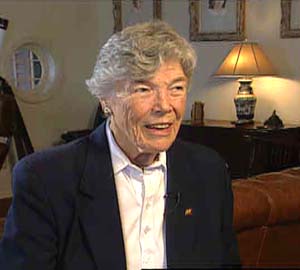
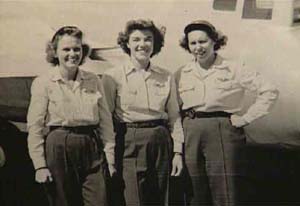
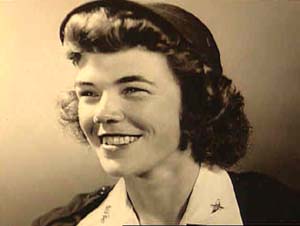
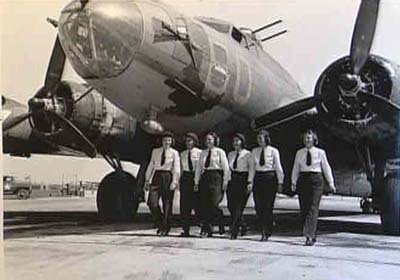
Brother Wease
Brother Wease, Rochester radio personality for the past 19 years, spent 3 tours of duty in Vietnam.
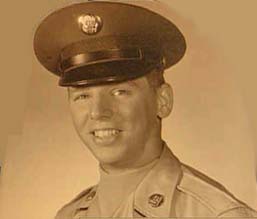
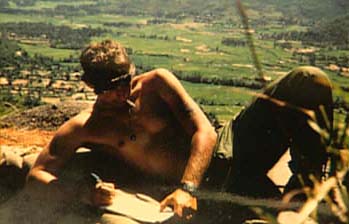
Seven Sons Go to War
The seven Hanehan brothers went to war — one did not return.
Feb. 28. 1944

Dear Kate and George
Your letter made me feel alive once more—an inspiration, so to speak, for one existing in a place so remote from even a resemblance of civilization. I bow before thee on bended knee, offer my many thanks. You mention the presence of my good spirits. Might I add, in good spirit or in bad spirit, we live “only in spirit” over here. Hopes for the future, of course.
How come this fellow you mentioned could tell you in such great lengths about this place? We are strictly prohibited from it. I wouldn’t want you to know anyway. Of course, its not the paradise that so many people think it is. I, for one, think it affords one, especially a “youth” like myself, great opportunities. It is virtually a vast domain of unexplored territory. Perhaps his tale covered the New Gujinea front. I have attended that place but am no longer there. I have advanced to another island which, at present, is of an undisclosable nature. Exciting as it is, we are all enjoying it very much. Again, I repeat, plenty of experience available to the up and coming young man with hopes for the future.
George, congratulations on your 2B classification. I wish to hell I was one of those damn 4Fs.
Take it oozie, kids and don’t forget “If you don’t write you are wrong.” Kate Smith and I agree.
Much Love, Leo
— Leo Henehan, one of 7 brothers serving in WWII. Only one didn’t make it back
Leo Henehan
June 10, 1944 US Navy, Sampson, NY
Hi folks,
How is everybody in civilian life? Things are going along pretty good down here. The final week was the worst. It is damn hard to change overnight to be a sailor but I guess I made it. I wouldn’t advise anyone to get in—stay out as long as you can. It isn’t what I thought it was. I am counting the days already. I want to see my family. Tip a beer over for me now and then. I don’t get any here. We don’t get much time to ourselves.
— Cliff ??, married to Helen Henehan who had 7 bros. In WWII, writing to in-laws
Sunday morning, April 16, 1944 Fort Ord, California
Dear George and Family,
From my address you can probably figure out what I am doing here, just in case you don’t I am in an amphibious tractor battalion. What they plan on doing with me is beyond me. I have had six hours of driving a tank so I guess I am supposed to be good, yeh! I don’t even drive a car—that is, I never have. And I certainly am not a sailor. For one thing, these tractors have a different motor in them than the M4 tank did. (after the birth of a son Al had not seen)

One of the Hanehans
Sat. April 29, 1944
Dear George, Kate and girls,
I’m just fine but would damn sight rather be home where I belong. Have you gotten to see the baby yet? Boy, wouldn’t I like to be able to see him and Liz. They expect me to be able to keep my mind on school but I just cant. I’m damn sick of school anyway. So far, I’m getting by but that is all. I understand Cliff is going in the Navy. I’m sorry to hear that. If he doesn’t do any more than I have he wont do anything. I’m the school kid and when not in school the K.P, kid. That makes a fellow feel as though he was doing an awful lot to get his war over. You can see what I mean. How do you stand in the draft, George? I hope you don’t have to come in. you can do more good where you are.
New Guinea, 30 July, 1944

The Henehan Brothers
Kate, George, and Family
I have been informed by my mother that you people have a very enjoyable week at the lake, some class I call it. But don’t start bragging to me about hose luxuries or I will really pour my good fortune on. In the first place, a while back I took a short ocean cruise which ended here in scenic New Guinea. After my arrival I got for myself a home on a long white sandy beach with ocean at my own disposal.
Every time I feel the urge for a dip in some cool refreshing salt water I merely don my bath attire and proceed on my merry way. I had better stop now or you will all pull claims and venture into this very luring tropical paradise. Now you tell me about your wonderful vacation at the most beautiful of the Great Lakes.
If you are interested in the voyage across the blue Pacific, it’s a great experience. To get the full enjoyment of it you will have to cross it yourself. As for myself, I enjoyed every minute. Perhaps because the ocean remained calm almost the entire time or else I was used to the water from my stay at Monterey. One thing: the ship’s crew made a big fuss about crossing the equator. They had the usual ceremony of initiating all the scallywags. I am now one of the tried and true shellbacks.
Naturally, I cant tell you where I am, what’s here or what, if any, our plans are. In a nut shell, anything military. That only leaves the ocean and the jungles and perhaps how little work I have done. I have finally got my mansion on the beach set up which I share with five other persons because of the war.
— Al Henehan, one of 7 brothers serving in W.W.II. Only one didn’t make it back
Resources
Preservation and Primary Documents:
American Experience War Letters: https://www.pbs.org/wgbh/americanexperience/films/warletters/
The Center for American War Letters: Preservation of war letters and other historic documents. http://www.warletters.com/
National Archives and Records Administration: Search the National Archives for primary documents, photographs, images. https://www.archives.gov/research
Library of Congress Digital Collections is a gateway to primary source materials relating to the history and culture of the United States.: https://www.loc.gov/collections/
Historical Background & Research Sites:
World of 1898: The Spanish American War: A Library of Congress collection: http://www.loc.gov/rr/hispanic/1898/
New York States Newspaper Project: Identifies, describes, preserves, and makes available to researchers the significant newspapers in all communities in New York State since the first publication in 1725. From the NYS Library. http://www.nysl.nysed.gov/nysnp/
Genealogical Resources
Ellis Island Family History Center: http://www.ellisisland.org/
Cyndi’s List of Genealogical Resources: Including Diaries & Letters http://www.cyndislist.com/
Ancestry.com :
http://www.ancestry.com/1940-census – 1940 Census Records
http://search.ancestry.com/search/db.aspx?dbid=3693 – SSDI»
